

What is a tour operator and how does it work?
The tour operator is an integral component of tourism , yet many people are unclear about what a tour operator actually is or what they do.
In this article I will explain what a tour operator is and why tour operators are important. I will also talk about what the difference between a tour operator and a travel agent is, as well as the different types of tour operators.
What is a tour operator?
Definitions of tour operator, importance of tour operators, the difference between a tour operator and a travel agent, what does a tour operator do, products and services sold by tour operators, inbound tour operators, outbound tour operators, domestic tour operators, ground tour operators, the association of independent tour operators, the tour operator: to conclude.
Tour operators are inextricably linked to the package holiday model. The tour operator is the person or organisation who creates the package. A travel agency is then used to sell the package holiday.
In the chain of distribution , the tour operator is represented by the term ‘wholesaler’. This is because the tour operator is responsible for purchasing products of services in bulk and then redistributing them as a packaged product to consumers.
To put it simply, a tour operator is the person or organisation who takes the individual elements of a holiday (e.g. transfer, hotel, transport) and packages these together.
The types of package vary. Most commonly, tour operators are associated with mass tourism and the traditional package holiday market. However, tour operators do also play an important role in the production of niche tourism products and services too.
If you’re looking for a formal definition of a tour operator with a reputable source, you may want to reference Polyther, who in 1993, defined the tour operator as;
‘[an organisation or person] who has the responsibility of putting the tour ingredients together, marketing it, making reservations and handling actual operation’.
Similarly, Holloway (1992) states that;
tour operations undertake a distinct function in the tourism industry, they purchase separate e lements of tourism products/services and combine them into a package tour which they sell directly or indirectly to the tourists .
The Organisation for Economic and Cultural Development (OECD) define a tour operator as follows;
‘Tour operators are businesses that combine two or more travel services (e.g., transport, accommodation, meals, entertainment, sightseeing) and sell them through travel agencies or directly to final consumers as a single product (called a package tour) for a global price. The components of a package tour might be pre-established or can result from an “a la carte” procedure, in which the visitor decides the combination of services he/she wishes to acquire.’
Tour operators are an important part of the tourism industry .
Tour operators make the logistics of organising a holiday much easier for the consumer. This makes people more likely to travel, more often.
Tour operators have a lot of power. If they choose to sell holidays in a particular location, for example, then that location will receive many of the associated positive and negative economic impacts of tourism .
Tour operators are often vertically or horizontally integrated with other organisations, such as travel agents and airlines. This allows for easier management and distribution of products.
Tour operators typically build holidays en masse. This means that economies of scale play a key role in driving down prices- the more you produce the cheaper the product becomes! This is obviously beneficial to the consumer and helps travel agents to have a competitive advantage when selling holidays.
Many people are not aware that a travel agent and a tour operator are actually two totally different organisations and they are not aware of the difference between a tour operator and a travel agent.
In fact, it is quite easy to understand this difference!
A tour operator is the organisation which puts the different elements of a holiday together. And the travel agent is the organisation who sells it to the consumer.
Whilst this differentiation is pretty easy to comprehend, it is easy to understand why people get tour operators and travel agents confused. This is largely because many organisations will operate under the same company. For example, TUI has a tour operator and a travel agent (and an airline too). As a result, many people do not realise that in actual fact, there are two separate organisations doing two separate jobs.

Ultimately, a tour operator is responsible for putting the different elements of a holiday together into a commodified package.
To do this, there are a number of different roles and responsibilities that tour operator staff will have. This includes:
- Data analysis- which destinations will sell best, how many holidays should they sell etc
- Assessing suitability of accommodation, transfer and transport options
- Liaising with stakeholders e.g. coach operators, airlines, hoteliers and resort representatives
- Negotiating contracts
- Confirming reservations with airlines/hotels
- Managing and responding to customer feedback
- Undertaking market research
- Production of marketing material
- Providing pricing information
- Handling bookings, invoicing and issuing of tickets
- Working with travel consultants from different travel agencies to put holiday packages together
Tour operators have a number of products and services that they sell, depending on their specific business model, business intentions and target market. A tour operator will typically package together two of more elements to form a packaged product, which is then sold at an inclusive price.
Examples include:
- Package holidays
- Accommodation
- Information on destinations
- Representative service in resorts
Types of tour operator
Tour operators come in all shapes and sizes. Some are large, multinational organisations and other are small, independent business.
Different types of tour operators develop products for different types of tourism . This can include the mass market, niche tourism market, special interest tourism, the luxury market, tailor-made products and dynamic packages .

There are four different types of tour operators, which I will explain below.
- Inbound Tour Operators
- Outbound Tour Operators
- Domestic Tour Operators
- Ground Operators

An inbound tour operator is one who facilitates inbound tourism .
The aim of an inbound tour operator is to bring tourists in to a particular country or countries.
Inbound tour operators will often collaborate with local travel agencies and transport operators to facilitate travel arrangements for their customers.
Inbound tour operator example: A group of German tourists conduct a tour of China, encompassing a visit to Shanghai , Hangzhou and the Yellow Mountains . The tour operator who organises their travel is Chinese-based company China Highlights . This company is based locally in China and they offer local, Chinese tours.
An outbound tour operator is one who facilitates outbound tourism .
The aim of an outbound tour operator is to send tourists out of a particular country or countries.
Outbound tour operators will often collaborate with foreign travel agencies and transport operators to facilitate travel arrangements for their customers.
Outbound tour operator example : A family of four from Liverpool, UK want to book an all-inclusive summer sun holiday in Alicante. They book through TUI , the largest tour operator in Britain, who specialises in outbound travel. They are based in the UK, but they work with foreign partners to facilitate holidays overseas.
A domestic tour operator is one who facilitates domestic tourism .
The aim of a domestic tour operator is to organise travel within a particular country or countries.
Domestic tour operators will often collaborate with domestic travel agencies and transport operators to facilitate travel arrangements for their customers. Domestic tour operators will often also serve the inbound tourism market.
Domestic tour operator example : A group of twenty-something boys from Chicago want to travel to Florida for the spring break holiday. They want to do a tour of the local attractions in the area and have some time to relax on the beach . They organise their travel through the tour company, Trek America . Staff at this company are experts in domestic travel within the USA.
A ground tour operator is an organisation who dopes the ground work as grass roots level.
Many tour operators do not have connections in all places around the world, therefore they build a network of connections to help them run their business.
Essentially, some of the work is passed on to a third party, known as a ground operator. This work may include negotiating local contracts, liaising with local suppliers and providing market data, amongst other things.
This is especially common for small tour operators.
You may also hear ground tour operators referred to as handling operators or handling agents.
Ground tour operator example : A backpacker wants to ‘give something back’ and book a volunteer tourism holiday in Kerala. She wanted to use a known and trusted tour operator to book her trip so she booked it with Intrepid Travel . Intrepid Travel create and sell adventure holidays all over the world, and it is impossible for them to have contacts and every staff in every corner of the globe. Therefore they work with local ground operators, who do the work on the ground. In this instance, the ground organisation is Iris Travel – a tour operator based in Kerela, India.
The Association of Independent Tour Operators , abbreviated as AITO, is a travel industry trade group (like ABTA or ATOL) based in Britain. They launched in 1976.
The AITO represents around 120 independent tour operators across 200 countries.
These tour operators provide access to a huge range of activities including city breaks, safaris, luxury holidays and much more. The AITO is based in Twickenham, south-west London.
The AITO does a variety of things. Most importantly, you can be reassured that your holiday is well-protected thanks to the Association of Independent Tour Operators.
They assess every member financially as well as by their own business practice code before granting membership; this means that you are guaranteed clear and accurate descriptions of holidays as well as tour standards that are consistently monitored.
Tour operators are an important part of the tourism industry, and with AITO, you have added security when booking your travels through a tour operator. Hopefully after reading this article you are now confident with what a tour operator is, how these organisations work and the different types of tour operators operating the market.
If you liked this article, why not take a look at these too?
- Types of travel agents | Understanding tourism
- What is e-tourism and how is it changing travel?
- 10 jobs in travel and tourism that will be BIG in 2022 and beyond
- What does the World Travel and Tourism Council do?
Tour Operators
Tour operator is an organization, firm, or company who buys individual travel components, separately from their suppliers and combines them into a package tour, which is sold with their own price tag to the public directly or through middlemen, is called a Tour Operator .
More precise tour operators are primarily responsible for delivering and performing the services specified in a given package tour. They can provide these services themselves as some have their own cars and coaches, hotels, and other travel-related services or can obtain these from the other suppliers. That is why they are called manufacturers of tourism products .
Tour operators are sometimes called wholesalers but this is partially true because a wholesaler buys goods and services in bulk at his own account to prepare a tour package and then retails it through the travel agencies or directly to clients. However, a tour operator who has his own one or more tourists products components, (SOTC, TCI, Thomas Cook, Indo Asia KUONI formulates a new tourist product for example ‘ inclusive tours .’
Tour operators generally offer a variety of package tours to cater to the needs of different kinds of travelers.
Definitions of Tour Operator
Poyther (1993) defines, “tour operator is one who has the responsibility of putting the tour ingredients together, marketing it, making reservations and handling actual operation.”
Holloway (1992) stated that tour operations undertake a distinct function in the tourism industry, they purchase separate elements of tourism products/services and combine them into a package tour which they sell directly or indirectly to the tourists.
Today, tour operators have become highly competitive. They endeavor to achieve a high volume of turnover, and maximum International and domestic market share by effectively operating. Moreover, the success of many developed and developing nations as tourists destinations depend heavily on a tour operator’s ability to attract tourists, development and promotion of tourism plant, diversification of tourism product and their social responsibilities to develop a remote and backward area.
Types of Tour Operators
Tour operators are basically categorized into four types . These are categories on the basis of their nature of the business and its operations.
Inbound Tour Operators
Outbound tour operators, domestic tour operators.
- Ground Operators
These are also known as incoming tour operators . Technically, the operators who receive guests, clients/tourists, and handle arrangements in the host country are c alled inbound tour operators . For example, a group of American Tourists is coming through TCI Ltd. to India and the company makes arrangements and handles the group in India then TCI is called an inbound tour operator.
Incidentally, the inbound traffic to the country for the last two decades has been decreasing. Essentially the tour operators need to adopt innovative marketing strategies and should introduce a special interest tour to cater the special needs of Japanese, Americans, French and British people.
Tour operator who promote tours for foreign destinations, maybe business tour or leisure tour is called outbound tour operators . For example a group of American tourists going to a trip of India and Thomas Cook handle arrangement in America like as ticket reservation, hotel booking etc. then Thomas Cook is called Outbound Tour operators in the context of America.
Domestic tour operators are those who assemble, combine tourist components into inclusive tours and sell it to the domestic travelers. In general, these tour operators provide travel services within the tourist’s native country.
The domestic tour operators operate within the boundary of the home country and offer package tour to the travelers viz. Domestic inclusive tours or independent tours.
Ground Operators/Destination Management Companies
These are commonly known as handling agencies and their main function is to organize tour arrangements for incoming tourists on the behalf of overseas operators. Let us take the case of India as a destination that – has a varied culture.
When a tour operator himself promotes beach holidays, wildlife holidays, adventure tours, heritage tours at the different places, the difficulty arises. It is the ground operator then who by handling the incoming travelers in the same season but at different places ensures that the entire operation is according to the package tours or agreements.
Sometime when a handling agency is at a prominent tourist place i.e., Delhi and it has to make arrangements to Goa, then it contracts (If it has no office of its own) with a local operator (known as excursion agent) to handle the arrangement on his behalf.
Why Ground Operators?
Obviously, the tour operation companies do not have close contact with suppliers, governments, destinations and so on. It leaves no choice with the companies but to appoint handling agencies at the destinations. The main reasons are:
- Introduction of new products or plant to promote an exotic destination.
- Lack of Government regulations.
- Lack of personal contract.
- Language problem.
- The company cannot establish its own branch.
Recognizing the very fact that the reputation, performance, and profitability of tour company in its own market largely depends on the efficiency and effectiveness of ground operators, it has because necessary for the company to consider various factors before the selection of a handling agency, they are:
- Size of business
- Professional staff
- Length of business
- Area of operation/Product line
- Market share
Functions of Ground Tour Operators
Over the years of functions and activities of the destination, companies have changed drastically to cope with the changing environment of the tourism industry. In fact, today’s destination companies have become more professional and are bound to provide personalized travel services to the tourists. The following functions are performed by ground tours operators:
- Land arrangement
- Contract and Negotiate with other vendors
- Handling of Arrival and departure procedure
- Planning and organizing local package tour
- Escorting the tourists
- Providing market information
- Costing and pricing package tour
Practically, if we see the working of the travel agencies and tour operators in the industry we find that most of the organizations are performing different types of activities like the retail travel agency , wholesale travel agency, and tour operators.
The travel agency business is no longer an amateurism. Over the last two decades, the pattern and structure of travel agencies have changed to meet tough challenges in the international market. Today, small-scale agencies are finding the travel industry increasingly complex.
Thus, the small and medium scale travel agencies are disappearing or merging or falling instead of rising. On the other hand, a new concept has also emerged i.e. tour operation business . The tour operation business is new but a maturing business at the global level.
Functions of Tour Operator
A tour operator is an organization, firm, or person who is responsible for the actual arrangement of transport and accommodation facilities on any tour or vacations. They are also responsible for operating and providing vacation through contracting, booking, and packaging together of the various components of the tour such as hotel, transportation, meals, guides, optional tours, and sometimes flights.
A tour operator is like a service provider, providing the most convenient option for tourists to stay, visit, as well as leave from the city. A tour operator owns a high volume of travel services across carriers, services, and accommodation. Some most important functions of the tour operators are following as:
Planning a Tour
The most important functions of the tour operators are planning a tour. Tour operators plan a tour and make tour itinerary which contains the identification of the origin, destination and all the stopping point in a traveler’s tours. A prospective tour operator also gives advice to intending tourists in various types of tour programmes, which they may choose for their leisure or commercial travel.
Making Tour Package
Tour operator buys individual travel components, separately from there suppliers and combines them into a package tour. Tour operators make tour package by assembling various travel components into a final product that is called tour package which is sold to tourist with own price tag. Making tour packages is also an important function of Tour Operator.
Arranging a Tour
Tour operators make tour package and also arrange a tour according to tourist demands. Tour operators arrange the tour package and various tourists activities to provide the best experience to tourists/traveler.
Travel Information
Whatever the size of tour operators, it has provided necessary travel information to the tourists. This task is utterly difficult and very complicated. A tour operator must give up-to-date, accurate and timely information regarding destinations, modes of travel, accommodation, sightseeing, immigration, health and security rules about various permits required to travel in a particular area etc.
Reservation
It is a very important function of all type tour operators and travel agencies. Tour operator makes all the reservation by making linkages with accommodation sector, transport sector and other entertainment organizations to reserve rooms, and seats in cultural programmes and transportation.
Travel Management
Tour operators manage tour from beginning to the end of the tour. A tour operator has the responsibility to look after the finer details of a vacation or tour such as hotel, accommodation, meals, conveyance etc. Tour operators provide travel guide, escorting services and arrange all travel related needs and wants.
Evaluate the Option Available
Tour operators evaluate all available options to provide a unique or unforgettable travel experience to tourists during their journey. Tour operators evaluate the various options available for a tour package and provide best of them to tourists.
Tour Operators makes tour packages and promote them into various tourists markets at domestic as well international level. Tour operators promote a travel destination to attract a large group of tourists at domestic as well as international level. In the promotion of tourist destination, tour operators play a key role. Travel agencies or tour operators are called as image builder of a country.
Sales and Marketing
Tour operators do sales and marketing of tourist products. Tour operators buy individual travel components, separately and combine them into a tour package, which is sold with their own price tag to the public directly. Tour operators do marketing of tourist destinations and tourism product to attracts the attention of the tourists/travelers.
Taking Care of Glitch
Tours operators are also called handling agencies which handles tour package and take care of all the glitches and problems arises during a tour package. Tour operators fix the glitches and provide the best available alternative to tourists during their journey.
Importance of Tour Operators
Tours operators play a key role in the tourism sector. Tour operators create tourist products, promote them a finally sold them to tourists.
Tour operators provide the best and competitive price to the tourist. Tour operators negotiate with suppliers of tourism products such as hotels, airlines and provide the best possible price to the tourist. Tour operators buy tourist products in bulk and get huge discounts from suppliers. So that they provide tourist products at a cheap price.
Tour operators organized a tour in the best way. They personalize and make sure each and every component of the tour is well-taken care. Tour operators provide the best travel experience during a tour. Tour operators save tourists time and money.
Tour operators provide immediate support systems at the host country as well as a foreign land. When tourists travel to a foreign land and things get uncertain, maybe its a health or loss of documents and need to return back or change of travel plan. A qualified tour operator takes care of all these unseen events with efficiency.
Tour operator caters to the needs of tourists on the based on their taste of travel. Tour operator provides all the best available option according to tourist needs and demands
Difference between Travel Agent and Tour Operator
There is a lot of confusion about the difference between tour operators and travel agents what exactly makes them different. The main difference between a Travel agent and Tour operator are following as:
- A travel agent is a person who has full knowledge of tourist product – destinations, modes of travel, climate, accommodation, and other areas of the service sector. He acts on the behalf of the product providers/principals and in return get a commission.
- Tour operator is an organization, firm, or company that buys individual travel components, separately from their suppliers and combines them into a package tour, which is sold with their own price tag to the public directly or through middlemen.
- Tour operators are like wholesalers and travel agents are the retailers.
- A tour operator makes the package holidays up and the travel agents sell them on.
- Tour operator taking up the bulk of the responsibilities and his fee is obviously much greater than a travel agent.
- A tour operator has the responsibility to look after the finer details of a vacation or tour such as hotel, accommodation, meals, conveyance, etc.
The wholesale travel agencies may offer or operate the package tours or may specialize in developing tours for inbound as well as outbound travelers. They are often referred to as tour operators, but there is a difference between Wholesale Travel Agencies and Tour operators .

- Tourism Management Tutorial
- Tourism Management - Home
- Tourism Basics
- Tourism Management - Introduction
- Tourism Management - Types
- Tourism Management - Terminology
- Tourism Management - Factors
- Tourism Management - Demand
- Tourism Mngmt - Motivation Factors
- Maslow's Pyramid of Motivation
- Consumer Behavior in Tourism
- Tourism Management - Plog's Model
- About Tourism Destinations
- Destination Awareness
- Tourism Management - Milieus
- Tourism Management Destination
- Tools for Destination Management
- Managing Tourism
- Tourism Management - Supply
- Tourism Functional Management
- Business Departments
- Market Segmentation
- Tourism Mngmt - Marketing Mix
- Tourism Mngmt - Products & Services
- Developing Product
- Product Development Phases
- Tourism Impacts, Trends, & Future
- Tourism Management - Impacts
- Tourism Mngmt - Trends & Future
- Tourism Management Resources
- Tourism Management - Quick Guide
- Tourism Management - Resources
- Tourism Management - Discussion
- Selected Reading
- UPSC IAS Exams Notes
- Developer's Best Practices
- Questions and Answers
- Effective Resume Writing
- HR Interview Questions
- Computer Glossary
Products and Services
“Don’t give up and always keep on believing in your product. Because if you don’t, how can you make others believe in it?” − Niels Van Deuren, Founder, housinganywhere.com.
The tourism industry as a whole survives because of various tourism products and services. Tourism industry is flexible. The products of tourism cannot be easily standardized as they are created for the customers of varied interests and demands. As the tourism products are mainly the tourists’ experience, they can be stored only in the tourists’ memories.
Let us understand more about tourism products and services −
Types of Tourism Products
The tourism products are grouped into the following types −
Tourism Oriented Products (TOP)
These are the products and services created primarily for the tourists and also for the locals. These products need a great share of investments in private sector. A few of them are −
- Accommodations; For example, Taj, ITC Hotels.
- Transportation; For example, Owning taxis, luxury buses, and boats.
- Retail Travel Agents
- Tour Operators
- Shopping Centers such as malls
- Cinema Theatres such as PVR
- Restaurants for Food and Beverages
- Tourism Information Centers
- Souvenirs Outlets
- Museums, Temples, Gardens, and Theme parks
Residents Oriented Products (ROP)
Here, the products and services are created mainly for the local residents staying at a particular tourist destination. This category requires investment in public sectors more. Some of them are −
- Public Parks
- Banks and ATMs
- Petrol Pumps
- Postal Service
Intangible Products of Tourism
They include −
Bookings of accommodations, theatres, and at various sites.
Tourists’ experience by visiting a destination, eating at a restaurant, or performing an activity.
Tourists’ memory which is created by storing the details of events and experience on the tour. The high degree of satisfaction or dissatisfaction is often stored as a long term memory.
Transportation of tourists and their luggage from one place to another.
Tour Operator’s Products and Services
To realize the facilities and experience a tourism product offers, service is required by skilled and qualified staff. The tour operator provides the following typical products and services −
Accommodations
The tourist destinations are equipped with different types of accommodations. They cater for tourists’ stay at the destination.
Serviced − This type of accommodation is supported by skilled staff such as housekeepers, drivers, guides, and cooks.
Self-catering − This accommodation offers staying facilities but dining is required to be self-catered. It is equipped with cooking, fuel and facility, some basic supplies such as tea/coffee/sugar sachets, and a drinking water source.
Hotels − Budget rooms to 7* hotels with classy amenities. The hotels contribute a major share of imparting the experience to the tourists by providing best services and amenities.
Guest Houses − Owned by business or government organizations, which can be used by its staff and staff relatives.
Camping Sites − They are open sites often located in areas of lush greenery. They are equipped with clean place to pitch the personal tent, a water supply, and electric supply. Camp sites have common rest rooms.
Reservations
The tour operator is responsible for making reservations for special events or activities the tourists are interested in. At some places, the reservations are required to be done well in advance to avoid last minute hassles. The events or activities such as a music concert or a theatre show, visiting a theme park or a zoo, require people to secure seats or avail entry with prior reservations.
Guided Tours
The tour operators can arrange guided tours. Some qualified staff who can get access to the place, explain the importance of the place, support, and guide the participants through the entire visit. The guide is arranged to accompany the tour participants as a part of tour.
Transport Facilities
These facilities are for travelling from one place to another.
Surface Transport − It includes support of transport by road or water.
Air Transport − This is the support of transport by air, generally given for long distance travel. Many times the tours include a halt of a couple of hours at transit destinations. Today the airports are built and maintained as engaging tourist terminals by providing amenities such as spas, lounges, food joints, bars, and book shops, retail shops for selling authentic local food, clothes, and souvenirs.
Today the Airlines are no more backstage when it comes to caring for their customers. They offer loyalty programs to their customers under Frequent Flyer Program to encourage the customers to travel more and accumulate points and redeem them against travel or rewards.
Dining Facilities
The tour operators can book accommodation that provides dining facilities or it can tie up with the local restaurants which are ready to entertain groups. If the tour package is all inclusive, the tour operator pays for breakfast, lunch, and dinner. If not, the tourists need to pay from their own pocket.

TUI Sustainability Agenda
Ambitious goals, pioneering initiatives. How we drive the sustainable transformation of TUI and the tourism industry.

The Mallorcans
Fascinating video series about Mallorca, the nature and the local people.

LIFE AT TUI
Discover what it’s like to work at TUI from those who do.

TUI WORKWIDE
As one of the world's leading tourism groups, TUI believes that our work should reflect the fun, excitement and adventure of travel.

Making travel experiences special
For more than 19 million customers TUI Group offers all services under one roof with leading tour operator brands, 1,200 travel agencies, online portals, airlines and incoming services.

Take off with TUI
Five TUI-owned touristic airlines with a fleet of over 130 aircraft – including the latest Dreamliner – convey our guests to their holiday destinations.

Number one leisure hotelier in Europe
TUI Group has more than 400 hotels, resorts and clubs with well-known brands such as RIU and Robinson in more than 35 countries worldwide.

Riding the waves
Seaborne holidays are provided by our 16 cruise liners, ranging from MS Europa and MS Europa 2 in the luxury class to the Mein Schiff fleet operated by TUI Cruises.

TUI Care Foundation
The organisation “works global and acts local“. Through strong partnerships with local and international organisations and by

SPREADING HAPPINESS
Our employees in over 100 countries are dedicated to helping our customers experience the best days in the year and contribute to our brand promise “Live Happy”.
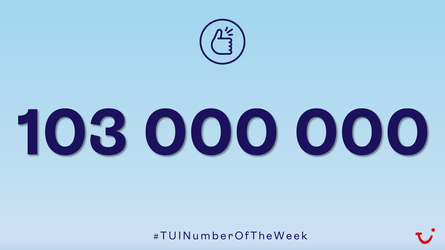
As every week, the "Number of the week" series brings you closer to an interesting figure from the TUI world. This time, you'll find out what the number of video views from our TUI Careers TikTok channel has been since its launch.

TUI Group is accelerating its international expansion with entry to the Latin American market as a new sales region. This strategic move capitalises on TUI’s technology and the expertise of its Spain & Portugal team, positioning the company for substantial growth across the region.
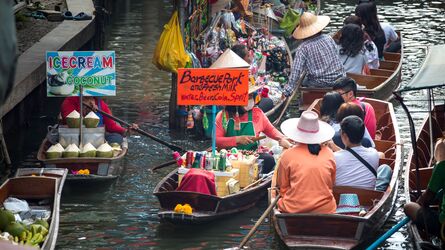
To cater to the growing appetite for culinary tours and inspire travelers in search of their next gourmet getaway, TUI Musement has carefully curated a selection of its best-selling and newest delectable experiences for food lovers across the globe.

The leisure hotel brand TUI BLUE is strengthening its presence in Asia. After launching new hotels in Thailand and Vietnam, the brand is now making its debut in China and Malaysia.
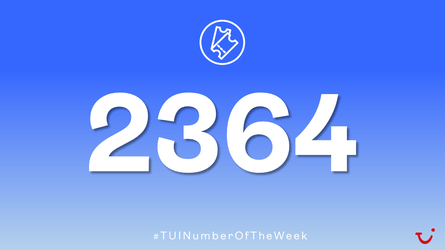
Our series “Number of the week” brings you closer to an interesting number from TUI every week. This week, it’s all about teamwork to put a smile on the faces of our guests on holiday...
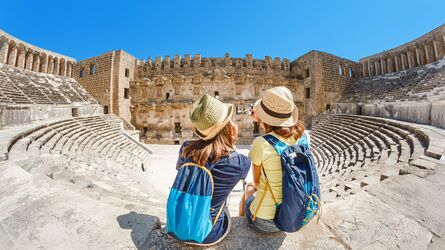
TUI Group is further strengthening its position in the Tours & Activities industry through a strategic partnership with Fred. Olsen Cruise Lines. The collaboration enables travellers on Fred. Olsen’s renowned small ships to discover and explore destinations independently.

During a recent visit to Ankara and Istanbul, TUI Group CEO Sebastian Ebel has reaffirmed the company's commitment to further developing the tourism sector in Türkiye.
TUI Newsroom
- Hotels & Resorts
- Sustainability
- Tours & Activities
Investor Relations
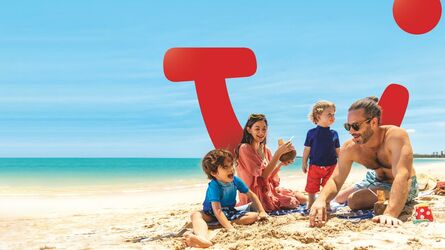
The FY24 Q3 Results were published on 14 August 2024.
- FY24 Q3 Report
- Presentation (PDF)
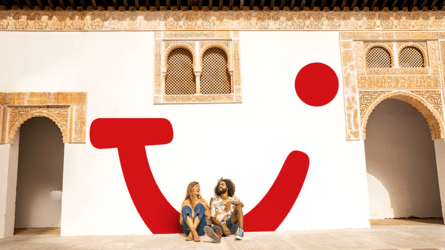
The FY24 Q2/H2 Results were published on 15 May 2024.
- FY24 Q2/H1 Report
- Q2/H1 Webcast
Financial Calendar
- 24 September 2024 Pre-Close Trading Update
- 11 December 2024 FY24 Annual Report
How we significantly reduce our environmental footprint and maximise positive impacts in holiday destinations.
How to raise a concern.
At TUI, we are committed to respecting the law and acting with integrity. We expect the same from our business partners and suppliers. If you are aware of potential violations of laws and policies related to TUI or caused by a TUI supplier, we strongly encourage you to use our reporting channel .
We use cookies to provide you with an optimized website experience. They include cookies for the operation and optimization of the website as well as cookies for analyses, retargeting and to provide personalised content on websites by third party providers. By clicking on Accept you are agreeing to the use of non-essential cookies. If you don't want that, you can Decline All the use of cookies or change your Settings at any time. For more information, including the processing of data by third party providers, see our Cookie Notice . You can find further information on the use of cookies at any time in our Cookie Notice and our Privacy policy . You will find the Imprint here.
Choose which cookies are permitted by using the “Status”-Switch. Save your settings with the button “I Agree”.
You can find further information on the use of cookies at any time in our Cookie Notice and our Privacy policy . You will find the Imprint here.

Download WP Travel
Please enter your email to download WP Travel and also get amazing WP Travel offers and Newsletters.
What is a Tour Operator? Types, Importance, Pros & Cons
Home » Blog » What is a Tour Operator? Types, Importance, Pros & Cons
Tour operators are the masterminds behind many unforgettable vacations. They organize travel experiences taking the hassle out of planning for travelers ensuring a seamless journey.
But what exactly are tour operators? What do they do, and why are they important?
Stay with us as we discuss all the above queries and more!
Table of contents
What is a tour operator, 1.inbound tour operators, 2.outbound tour operators, 3.domestic tour operators, 4.receptive tour operators, 5.ground tour operators, roles of a tour operator, importance of a tour operator, best tour operators, best tour operator software, tour operator vs travel agency, difference between a tour operator and a travel agency (infographics), frequently asked questions.
A tour operator is a company that specializes in designing and packaging travel itineraries . They act as a one-stop shop for travelers, offering pre-arranged tours that typically include flights, accommodation, transportation, sightseeing activities, and sometimes even meals.
They cater to various interests and budgets, offering adventure trips, cultural experiences, luxury getaways, and more. A tour operator not to be confused with a travel agency thinks up ideas for holidays, researches the ideas, designs the holiday itinerary, and contracts all the services needed.
Types of Tour Operators
Tour operators can be divided into five main categories: inbound, outbound, domestic, receptive, and ground.

Inbound tour operators bring tourists into the country in groups or through individual travel packages. They make all the arrangements in the host country, and the trips they organize are mainly intended for foreigners visiting the country.
When a group of Indian tourists wants to explore France, the company in France that organizes the whole trip is called the inbound operator. So inbound operators are local and offer trips that include their own country.
Unlike inbound, outbound tour operators work in their own country to take travelers to other countries. These are operators that market their travel to international destinations for either business or leisure.
For example, suppose a group of German tourists are planning a trip to India. Then the outbound operator is a German travel company that handles all ticket and hotel reservations.
Domestic tour operators are those who put together complete travel packages and sell them to domestic travelers. In other words, they are operators that offer travel packages and trips in the tourist’s home country.
Domestic travel usually involves residents of a certain country traveling within that country. They can visit national parks, scenic areas, hospitality tours, city tours, hikes, etc.
Receptive Tour Operators (RTO) provide travel products to companies in other markets (as a business-to-business relationship).
In particular, RTOs sell travel products to operators and/or travel agents, whether sold in a package or individually. They are primarily wholesalers and do not sell directly to the public.
Ground Tour Operators operate domestically. However, they differ from domestic operators in that they organize trips for inbound tourists on behalf of the inbound operator (and sometimes also the outbound).
Tour operators are responsible for the operation of a vacation by contracting, booking, and packaging together various travel components . These components can include: hotel, transportation, meals, guides, optional tours, and flight.

- Development of Tour Packages: These professionals develop travel packages for individual clients or groups of travelers. They work with clients to understand their interests and recommend different attractions, accommodations, and transportation options to help clients choose a travel package.
- Negotiating Prices: Companies usually negotiate prices with other vendors, such as hotels and transport companies. For example, they can ask the hotel to lower the room rates for a large tourist group.
- Travel Management: These professionals help organize travel plans for clients to reach their destinations. For example, they can book a bus to help customers travel between cities or a rental car to help customers reach various attractions.
- Providing Customer Support: The company provides customer support to help their customers prepare for their trips. For example, they can answer customers’ questions about the destination, provide information about exchange rates, or notify them of changes to travel plans.
- Travel Budgeting: Travel companies work with clients to help them budget for their trips. They develop different itineraries at different prices and advise clients on accommodation and sightseeing within their desired budget.
- Researching Travel Options: These professionals research different trips to give their clients recommendations on places to visit, stay, and eat. They read articles and search the web for information on travel trends and new destinations to stay current in their field.
Explore this article “World Tourism Ranking by Country 2024”
Pros and Cons of Tour Operator
A tour operator puts together packages by bundling the individual services making up itineraries. That’s why it’s sensible to review your options.
So, what exactly are the advantages and disadvantages of using a tour operator?
- Competitive Prices: They can offer more economical packages than individual options providing better value for money. They often negotiate discounted rates, making travel more affordable.
- Peak Season Options: They can anticipate peak season dates and offer options for these times.
- Convenience: Travel companies can provide seamless connections from one location to the other. They handle everything, allowing travelers to relax and enjoy the experience.
- Expertise: Their knowledge of destinations ensures a well-rounded itinerary with hidden gems and local experiences. They can ensure that travelers don’t miss any hidden corners of a destination.
- Reduced Stress: No need to research or book individual components, leaving travelers free to focus on having fun.
- Resolve Unseen Problems: Travel companies can resolve unforeseen problems, such as flight delays or cancellations.
- Safety and Security: Companies can provide an environment of safety for visitors. They can assign guides for support and guidance, especially in unfamiliar destinations.
- Assurance: If the arrangements made by an operator fall short of what was agreed, you can seek redress by way of a refund.
However, working with an operator can have downsides as well. Some disadvantages may include:
- Less Flexibility: Itineraries are predetermined, offering less freedom for spontaneous exploration. If you discover an activity or a restaurant you’d like to try that isn’t on your pre-planned itinerary, you may not be able to explore it.
- Limited Personalization: Customization options might be limited compared to independent travel.
- Higher Cost : It might not be your cheapest option. Tour packages can sometimes be pricier than piecing things together yourself.
- Larger Groups: Tour groups can range from private trips to groups of 50 or more people. Some tours involve group travel, which might not suit everyone.

Tour operators play a vital role in the tourism industry by planning and coordinating travel plans, travel packages, activities, and itineraries for their clients.
They use their expertise and resources to create high-quality tour packages helping tourists travel stress-free. Other reasons why tour operators are important are:
- Competitive Pricing: They negotiate in advance with hotels and airlines and offer you the best rates.
- Well Organized: Since the company is a travel company, they want to provide you with the best ground services. They personalize and ensure that every part of the tour is well taken care of.
- Boosting Tourism: They promote destinations and generate tourist revenue, benefiting local economies.
- Ensuring Quality: They maintain high standards for travel experiences, making sure travelers have a positive experience.
- Convenience and Accessibility: They make travel accessible to a wider range of people, including those who might not have the time or expertise to plan their own trips.
- Immediate Support System: When traveling to a foreign country things can become uncertain at any time. A competent company handles all these unprecedented events efficiently.
- Supporting Local Businesses: They partner with local businesses, contributing to the growth of sustainable tourism practices.
- Networking Opportunities: A tour company targets many people like you. Staying, traveling, and eating together is a great way to increase your network.
There isn’t a single best tour operator as it depends on your travel style, budget, and destinations. However, here is a list of the 10 best travel companies & tour operators in the USA with 191,668 reviews. [Source: tourradar ]
Travel companies that organize guided tours use travel operations software to manage customer information, travel information, and background functions. This type of tour operator software helps companies keep track of the organizational aspects of travel such as schedules, itineraries, meal plans, and more. In addition, it tracks tourists and participants, as well as personal tasks and activities. Companies can use this type of software to manage costs, expenses, and revenue. Capturing 75% of the Global Tourism market with over 883,934+ downloads globally and surpassing software like Rezdy, Peek Pro, Bokun, and more, the best software is found to be WP Travel . Here’s a list of the 5 best tour operator software:
Check this article on Best Tour Operator Software for a detailed overview of features and prices.
A tour operator is a person or organization responsible for planning travel and vacation packages. G Adventures and Intrepid Travel are some famous examples.
A travel agency is a private broker or agency that sells holiday packages. American Express Travel is an example of a travel agency. While Booking.com is also a travel agency, it is regarded as an Online Travel Agency (OTA) rather than a traditional one.
When the tour operator creates services, the travel agency is the intermediary that sells those services.
Further differences between a tour operator and a travel agency can be discussed below:

Explore this article “Tour Operator vs Travel Agent- What are the Differences?”
Launching your own tour operator business can be an exciting and rewarding venture. Here’s a roadmap to get you started: 1. Research the market and develop a solid business plan. 2. Create a unique brand and effective marketing strategy. 3. Develop tailored tour itineraries by collaborating with local businesses. 4. Prioritize safety protocols and staff training 5. Integrate technology like online booking and tour management software.
To package a tour, tour operators first research trends, design itineraries, then source local activities, and negotiate bulk rates with hotels and transportation. With everything neatly bundled (accommodation, meals, travel), they create a price-conscious package and market it through various channels. Some even offer customization options for the customer.
Tour operators function by streamlining the travel experience. They utilize bulk rates on flights, hotels, and activities. This allows them to create pre-designed packages that bundle everything you need for your trip – flights, accommodation, transportation, and sometimes even meals or entrance fees. This one-stop-shop approach simplifies trip planning, letting you focus on enjoying the destination.
Here’s a step-by-step process to start your very own tour operator business. Research and Planning 1. Legal and Financial Consideration 2. Branding and Marketing 3. Operations and Logistics 4. Technology Integration 5. Hiring and Training Staff 6. Launch and Growth Strategies. To look into these steps in detail, check this article on starting a tour company .
No, booking.com is not a tour operator. It is one of the largest online travel agencies in the world. Booking.com does not create its own travel packages but helps tour operators from around the world market their packages.

Yam Bahadur Chhetri is a content writer and vivid contributor to the WordPress community and a WordPress enthusiast with an experience of 7+ years in the relative field. He also loves to develop WordPress Themes, Plugins, and custom WordPress development for clients.
Leave a Reply Cancel reply
Your email address will not be published. Required fields are marked *
Save my name, email, and website in this browser for the next time I comment.

Get WP Travel Pro
Create Stunning , SEO friendly and Fully functional Travel website within minutes . No Coding Required !
Suitable for any
- Travel Agency
- Tour Booking Services
- Travel Bloggers
Drive more Sales and Revenues from today !
$ 99 99 USD per year

📢 Santa has sent the gift for Christmas and New Year sales on all WP Travel Pro plans. 🛍️ Use coupon code "XMAS_NEWYEAR2024" at checkout.
Related posts

How to Increase Traffic to Your Travel Site in 2024?(15 Pro Ways)

Travel Agency SEO:Travel SEO Strategies with Indepth guide

What is Tour Operator Software? (Everything to Know)
Wp travel modules.
Need more features to save your time and to boost your travel business? WP Travel Pro comes with more powerful modules . While our core travel plugin provides almost all the features that a travel and trekking websites generally needs, our add-ons boost it’s capacity further to make it the best travel engine on WordPress. Whether you want to add new payment method to your site or brush up your trekking listings with beautiful maps show casing your trips, we have all your imagination covered. See all our add ons below to boost your travel website’s features further.
Conditional Payment

Weather Forecast

Import Export

Connect with WP Travel to Join the Travel Conversation
Documentation →.
Explore More
Customer Support →
We are here to help.
Facebook Group →
User Community Forum
Follow On Twitter →
Connect with us on Twitter
How Do Tour Operators Work?
To unlock the tourism industry's business and leisure travel potential, you must understand how tour operators work.
From package holidays to bespoke tours, tour operators make memorable holidays. Whether you're a domestic operator focusing on your country's destinations or an outbound operator designing trips abroad, this guide is for you.
The Role of Tour and Activity Providers
At the heart of the travel industry, tour operators like you, whether inbound or outbound, design travel packages that simplify things for tourists. This involves meticulous planning of land arrangements, accommodation, tours, and transport.
As a tour company, you may specialize in specific types of trips, such as leisure travel or business trips, creating packages that cater to your target market's preferences.
What are the different types of tour operators?
- Domestic Tour Operators : Focusing on the domestic tourism market, these operators provide travel packages within their home country.
- Outbound Tour Operators : These companies design holiday packages for travelers visiting other countries, often incorporating international destinations into their itineraries.
- Inbound Tour Operators : Inbound operators cater to tourists coming into their host country, providing local insights and experiences.
- Ground Tour Operators : Often known as ground operators, these firms handle local arrangements in the destination country, often working in collaboration with other tour operators.
How do tour operators work with accommodation and transport providers?

Tour operators play a pivotal role in crafting the perfect travel experience, and a big part of this involves working closely with accommodation and transport providers. Here's a glimpse at how this collaboration typically works:
Building Relationships with Accommodation Providers
- Negotiating Rates : Tour operators negotiate contracts with hotels and resorts to secure competitive rates. This often involves bulk booking or agreeing on fixed rates for a certain period.
- Customizing Guest Experiences : They work with these providers to tailor lodging experiences that align with the overall theme of the tour, whether it's luxury, adventure, or cultural immersion.
- Ensuring Quality and Standards : Regular inspections and feedback mechanisms are put in place to ensure that the accommodation meets the expectations and standards required for their clients.
Partnering with Transport Providers
- Seamless Logistics : Tour operators coordinate with various transport providers, including airlines, bus companies, and car rental services, to manage the logistics of getting travelers from one point to another.
- Group Deals and Scheduling : They often negotiate deals for group travel and ensure that transportation schedules align seamlessly with the overall tour itinerary.
- Quality and Safety Checks : Ensuring travelers' comfort and safety is paramount, so tour operators regularly check the quality of vehicles and the reliability of transport services.
Creating Cohesive Travel Packages
By integrating accommodation and transport seamlessly, tour operators create cohesive and hassle-free travel packages. This integration is crucial in providing a smooth and enjoyable experience for travelers, where every aspect of their journey is well-coordinated and managed.
Adapting to Client Needs
Tour operators remain flexible and responsive to their clients' needs, often customizing aspects of accommodation and transport to cater to specific preferences or requirements.
To summarize, negotiating strategically, ensuring quality, and meticulous planning are crucial to the relationship between tour operators, accommodation providers, and transport providers. In order to deliver great travel experiences that aren't just fun, they must be safe, comfortable, and just right to match discerning travelers' expectations.
How do tour operators work with travel agents and OTAs?

Tour operators team up with travel agents and OTAs? It's like having the best of both worlds in the travel industry.
Here's the lowdown: travel agents are like sales gurus. They've got the skills to match your cool tour packages with travelers looking for their next adventure. It's all about personal touches and making travelers feel special.
Now, let's talk about OTAs – think big names like Expedia and Booking.com . These guys are your ticket to the global stage. They're not just about showing off your tours; they're about connecting you with travelers from all over, 24/7. Plus, with their smart marketing tools and the power of customer reviews (which, let's face it, are gold in our world), you're setting yourself up for some serious visibility and street cred.
Combining travel agents' personal selling charm with OTAs' global reach is how tour packages stand out in this competitive market.
Talking about creating packages, how can you work with accommodation and transportation providers?
How to create inclusive tour packages?

As a tour provider, crafting appealing and inclusive tour packages , also known as package holidays or package tours, is key to attracting travelers.
These packages bundle services like flights, accommodations, and transportation for a hassle-free experience. Here’s how you can create comprehensive offers:
- Understand Your Travelers : Know who you’re designing for. Are they families, solo travelers, or adventure seekers? Tailoring your packages to fit their preferences is crucial.
- Forge Strong Relationships with Suppliers : Collaborate closely with accommodation and transportation providers. Strong partnerships can lead to better rates and unique offerings, making your packages more attractive.
- Quality Over Quantity : When choosing hotels and transportation options, prioritize quality. A well-selected hotel or comfortable transport experience can elevate your entire package.
- Flexibility is Key : Offer flexibility in your packages. Options for room upgrades, transport preferences, or even alternative activities can make your package more appealing to a diverse range of travelers.
- Highlight Unique Experiences : Include special experiences travelers can’t find elsewhere. Unique local tours or exclusive access to attractions can make your package stand out.
- Transparent Pricing : Ensure transparency in pricing. Hidden costs discourage travelers. Clear, upfront pricing builds trust and satisfaction.
- Feedback Loop : Regularly gather feedback from your customers and adjust your packages accordingly. Continuous improvement based on customer insights can significantly enhance your offerings.
By focusing on these areas, you can create inclusive tour packages that meet but exceed the expectations of your travelers, ensuring memorable and hassle-free trips.
How do tour operators pay suppliers?
For tour operators, establishing and maintaining a solid financial relationship with suppliers — including accommodation and transportation providers — is crucial for a smooth and successful business and tour operation itself. Here's a look at how these payments are typically managed:
Advance Payments and Deposits
Tour operators often make advance payments or deposits to secure services well ahead of tour dates. This is especially common with hotels and special activities that require early booking.
Credit Facilities and Post-Payment Agreements
In some cases, tour operators may have credit arrangements with suppliers, allowing them to pay after the service is delivered. This requires a high level of trust and a proven track record of reliable payments.
Bulk Payment Contracts
For regular or frequent services, operators might negotiate bulk payment contracts. Under these agreements, they pay a lump sum for a specified number of services or bookings over a period, often at a discounted rate.
Net Rate Agreements
Suppliers may offer net rates to tour operators, which are discounted prices exclusive of commissions. The domestic tour operators then mark up these rates when selling to customers, and the difference forms their profit margin.
Direct Billing for Services
In some collaborations, suppliers might directly bill the tour operator for services rendered, usually after completion.
Electronic Payments and Wire Transfers
With the digitalization of financial transactions, most payments are now made electronically. This ensures quick, secure, and traceable transactions.
Managing Currencies and Exchange Rates
For international tours, operators must adeptly manage payments in different currencies, considering exchange rates and transaction fees.
Contingency Funds for Unforeseen Expenses
Operators often set aside contingency funds to cover unexpected costs or last-minute bookings, ensuring that the tour runs smoothly without financial hiccups.
Why is the booking process so important for selling tours?

The booking process is crucial in the tour industry for several key reasons:
- First Impression Matters : This initial interaction sets the tone for customer experience and expectations.
- Ease Equals Sales : A simple, user-friendly booking system encourages more purchases.
- Trust Building : A smooth process builds trust, showing customers that they’re dealing with a professional operator.
- Upselling Opportunities : During the booking, there’s a chance to offer additional services or upgrades, enhancing the experience and increasing revenue.
- Data for Personalization : The information collected can be used to tailor future offerings and improve service.
- Effective Communication : This stage is vital for conveying key tour information and ensuring customer understanding.
- Reputation Impact : A positive experience can lead to recommendations and positive reviews, while a negative one can harm the operator's reputation.
- Resource Management : Understanding booking trends helps manage tours and resources.
In short, the booking process isn't just about securing sales; it's about shaping the entire customer journey, from first impressions to post-tour feedback.
Tips for Operators
Invest in a good, easy-to-use, and cost-effective booking software solution. Granted, it may incur some fees on your part, but think of the heavy lifting it does for you.
It does more than take reservations and bookings. It saves you tons of time with manual tracking, guest follow-up, and ticket management. It also eases the customer journey from point one to post-tour feedback.
Booking software solutions like TicketingHub save you stress and ease your guests. It charges 3% only for successful bookings.
Trusted by Egypt Sound and Light Shows, The Immersive Gamebox, Secret Food Tours, Sipsmith Distillery , and a hundred folds more - this software solution is jam-packed with time-saving features in an easy-interfaced navigation.
Whatever software solution you pick, aim for the solution that saves you time from needless complexities in design and usability - all while helping you stay profitable and leaving your guests satisfied right from the booking page.
Conclusion: Making Great Tours Happen
In wrapping up, it's clear that being a tour operator is about connecting the dots to create amazing travel experiences. Whether you're showing off the best spots in your own country or taking people on adventures abroad, the key is in the details – from picking great hotels to organizing smooth rides.
Your partnerships with local travel agencies, agents and OTAs are super important too. They help you reach more people and make sure your tours stand out. And when making tour packages, remember to listen to what travelers want and keep things flexible and interesting.
Don't forget, managing your money well, especially when paying for services, keeps everything running smoothly. And the booking process? That's your chance to make a great first impression and keep things hassle-free for your customers.
So, there you have it – mix in a bit of planning, a dash of good relationships, and a sprinkle of creativity, and you're on your way to creating trips that travelers will love. Happy touring!
FAQ Section
How important are tour operators.
Tour operators play a pivotal role in the tourism industry. They create and organize tour packages, catering to both business and leisure travelers. These packages simplify travel arrangements, offering hassle-free travel.
Tour operators are the key architects of memorable trips, ensuring travelers can explore various destinations easily.
What is the life of a tour operator?
Tour operators plan meticulously and collaborate with various stakeholders. They work closely with outbound and inbound tour operators, accommodation and transport providers, and even travel agents and online travel agencies (OTAs).
Their goal is to create appealing package holidays, manage travel arrangements, and provide tourism products that meet their target market's preferences.
What are the strengths of tour operators?
Tour operators have several strengths, including the ability to create inclusive tour packages that simplify travel for tourists. They can specialize in various categories, such as business or leisure travel. They can also collaborate with distribution partners like travel agents and OTAs to reach a wider audience.
Tour operators leverage market data to sell directly to their target market, offering tourism products that cater to different preferences.
What's the difference between a tour operator and a travel agent?
Tour operators and travel agents serve different roles in the travel industry. Tour operators design and create tour packages, manage travel logistics, and provide tourism products.
Travel agents, on the other hand, act as intermediaries between travelers and tour operators or suppliers. They assist customers in choosing and booking the right travel options, including tours created by tour operators, but they don't create the tours themselves.
Get the latest news and stay in touch with the industry secrets.
By clicking "Subscribe", you agree to our Privacy Policy and the data we do collect.
.jpg)
How to Manage my Tours and Activity Inventory?

Viator Payment Methods: Guide for Tour Operators
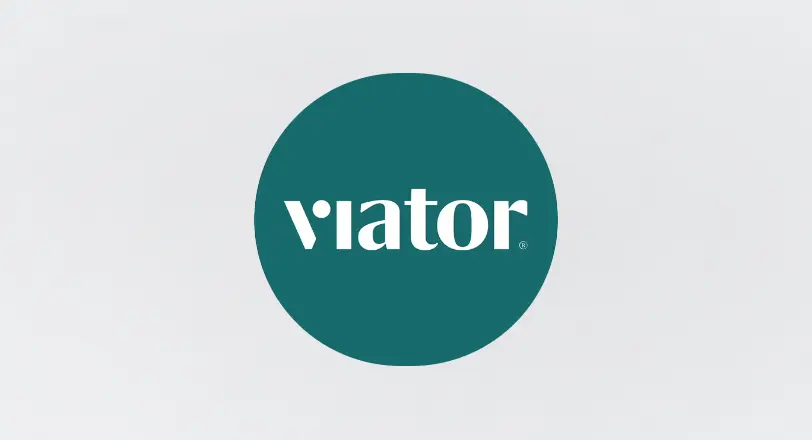
The Ultimate Guide on How to Sell Tours on Viator

10 Game-Changing Tricks to Boost Bookings for Photography Tours
Keep Reading

Navigating Success: Essential Business Tips for Tour Business Owners
We've compiled a comprehensive guide of essential business tips tailored specifically for tour business owners.
Discover how tour operators create seamless travel experiences through great partnerships, flexible packages, and easy booking processes.
- Customer Success
- Nezasa Stories
- Travel Software
- Travel Trends
- TripBuilder
Types of Tour Operators
We know that the travel market is vast, and it can be confusing trying to navigate the different types of tour operators and their offerings.
Whether you are a tour operator trying to choose which market to specialise in or a traveller looking for assistance with your next trip, we’ve got you covered!
In this blog post we will walk you through the main types of tour operators and explain how each one can help their customers to plan and book their dream trips.
What is the role of a Tour Operator?
Tour operators help travellers to design, plan, book and enjoy their trips, assisting with the entire customer journey from beginning to end.
They often combine components from several different companies such as airlines and accommodation providers as well as extras such as activities, transfers and entertainment, transforming them into tours which are sold to the public as a package .
The tour operators themselves are also responsible for the marketing of their travel packages, a topic that we covered in ‘ the tour operators’ guide to creating an exciting marketing strategy ’, and should be available for direct communication with the customer throughout the entire process.
Wondering what the differences are between each tour operator?
Well, we’re here to help.
While there are several different types of tour operator, the main ones include:
- Inbound Tour Operator
- Outbound Tour Operator
- Domestic Tour Operator
- Ground Operator
- Receptive Tour Operator
These companies can also focus on the mass market or can specialise on a niche group, such as eco-tourism, adventure sports or food tours.

Inbound Tour Operators
As we explained in ‘ Outbound vs Inbound Tour Operators ’, inbound tour operators are locally-based companies that work by bringing visitors into a specific country or destination , often partnering with other businesses such as accommodation and transport providers in order to offer customers package deals.
Inbound tour operators are also sometimes referred to as destination management companies, aiming to promote their destination as a whole to incoming travellers and assist them with all aspects of their trip. This also requires a knowledge of overseas markets and the needs and interests of different types of customers in order for them to promote their tours effectively.
Outbound Tour Operators
While inbound tour operators bring tourists into a country, outbound tour operators market to travellers in their own country and offer tours in international destinations .
When creating tour packages, outbound tour operators usually focus on specific countries, destinations or regions of the world, and also partner with businesses in the host country to provide customers with convenient and comprehensive packages.
A good example of an outbound tour operator is TUI , one of the world’s largest travel companies that works mainly by selling tours to overseas destinations and who is also one of our customers.
Domestic Tour Operators
As the name suggests, domestic tour operators put together packages for domestic travellers – those who are travelling within their native country . This type of business aims to promote travel within their own country, and offers packages in popular destinations.
Haven Holidays is a domestic tour operator that focuses on the British market by offering breaks in its self-catering holiday parks in an array of coastal destinations around the UK. These types of tour operators frequently offer family-friendly activities and diverse entertainment options for those who want to enjoy weekend breaks or summer holidays within their own country.
Ground Operators
Like domestic tour operators, ground operators also work within their own country . However, ground operators usually work on behalf of inbound or outbound tour operators and are the ones that provide the actual travel service in a destination, helping to organise and assist tourists.
This type of tour operator is especially useful for tours in far-flung destinations where it can be difficult to plan itineraries without local knowledge, expertise and contacts. Ground operators are likely to be on hand in the destination itself to organise transfers, negotiate special rates with accommodation providers or find the best local tour guides.
Receptive Tour Operators
Receptive Tour Operators provide tourism products , whether in the form of packages or single components, to other tour operators or travel agents . They do not sell directly to the public and usually follow a structure similar to a wholesaler.
RTOs are experts in their market , and help their customers to find the best accommodation providers, services and activities in their chosen destination. This type of tour operator makes money by adding a percentage rate to the final price that their customer is selling the travel product for.
For example, a receptive tour operator may work with an outbound tour operator by providing them with travel packages for a specific destination. The outbound tour operator then sells this tour package to its customers and adds an extra fee to the cost, which goes directly to the receptive tour operator.
Technology for Tour Operators
Here at Nezasa , we provide tour operators with a cutting-edge product that allows them to plan, book and customise their customers’ trips with ease. The use of a software solution like ours is an excellent way to simplify aspects of your business, allowing you to focus on the customer themselves.
Our TripBuilder software is a unique, seamless and integrated solution, designed to help you efficiently create hyper-personalised and flexible itineraries for your customers.
To find out more about our innovative products, make sure to sign up for our next webinar here .
Related Articles

Data-Driven Decisions: How Analytics Boost Tour Operators Growth
In this blog post, we will explore the ways in which data analytics can boost the growth of your tour operator and how Nezasa’s TripBuilder can help you.
August 22, 2024

Boost Your Basket Size: Proven Strategies for Tour Operators
Increasing average basket size - the total value of bookings made by each customer - is a key goal for tour operators.
August 1, 2024

Reselling for Tour Operators – The Ultimate Guide
Reselling is one strategy that allows tour operators and travel agencies to reach a wider market. Rather than only selling directly to the end customer.
July 25, 2024
- Search Please fill out this field.
- Manage Your Subscription
- Give a Gift Subscription
- Newsletters
- Sweepstakes
We independently evaluate all of our recommendations. If you click on links we provide, we may receive compensation.
- World's Best
Our Readers' Favorite Tour Operators in 2022
These are the companies Travel + Leisure readers trust to provide them with travel expertise and memorable experiences.
:max_bytes(150000):strip_icc():format(webp)/rachel-chang-36aff37f3d95496b8a40a59781ef89c2.jpg)
Note: If you’re looking for our most recent recommendations, check out the 2023 list of our favorite tour operators .
When it comes to an itinerary, Travel + Leisure readers want more than a string of photo opportunities — and the right tour operator makes all the difference in creating a trip of a lifetime versus one that simply checks off a list of sights. This year, our readers were especially drawn to companies that utilize local expertise and experience to thoughtfully design trips that will entertain as well as inspire.
Every year for our World's Best Awards survey , T+L asks readers to weigh in on travel experiences around the globe — to share their opinions on the top hotels, resorts, cities, islands, cruise ships, spas, airlines, and more. Readers rated tour operators and safari outfitters based on their staff and guides, itineraries and destinations, activities, accommodations, food, and overall value.
The top picks were noted for their deep knowledge of destinations and guides who "go the extra mile." One reader who has been traveling for more than five decades said a trip with Classic Journeys (No. 2) was the "very best" they had experienced. Others noted attention to pandemic safety details, while one who went to Norway was charmed by a "wonderful surprise dinner in Bergen out on the water that was fantastic."
Tour operators that seamlessly navigated the logistics of a trip also came out on top. Quasar Expeditions (No. 9) was noted "for really planning out every detail" so that "all you have to do is show up and have a great time." Meanwhile, of TCS World Travel (No. 10), a guest said: "You never lift a finger and just spend your time actually exploring the destination." They even added that they "learned so much" along the way.
Among the five companies on this year's list that weren't on last year's were two women-only tour operators that cater to travelers of all ages. AdventureWomen (No. 14) has multiday tours designed by women from Bhutan to Yellowstone National Park, while Explorer Chick (No. 15) has everything from day trips — like glassblowing in Baltimore and cave rappelling in St. Louis — to full itineraries in Machu Picchu and the Galápagos. One reader said her Everest Base Camp trip with AdventureWomen was filled with "like-minded women" who "bonded so well," while another said she felt it was a "safe tour group for women."
No matter which tour they chose, readers were most taken by the people they met along the way, as one said of Trek Travel (No. 13): "By the end of the trip, a group of strangers felt like longtime friends." Find out which other companies round out the list of the best tour operators below.
1. DuVine Cycling + Adventure Co.
A tour with DuVine goes far beyond just riding a bike — it's a way to really see the character of a destination. Case in point: even those who say they're not necessarily cycling fans have been converted. That's part of what helped the tour operator — which runs trips in Europe, the U.S., Latin America, and Africa — skyrocket from No. 14 last year to this year's top spot. Its "top-notch biking equipment" and "challenging but doable itineraries" didn't hurt either. One reader was especially taken by a guide picking figs off of a local tree in Puglia for an extra energy boost during a tough climb, as well as another guide singing to the group after dinner. As another reader put it simply: "They exceed your expectations."
Score: 99.12
More information: duvine.com

2. Classic Journeys
Score: 99.04
More information: classicjourneys.com
3. Artisans of Leisure
Score: 98.38
More information: artisansofleisure.com
4. (tie) Black Tomato
Score: 98.33
More information: blacktomato.com
4. (tie) GeoEx
More information: geoex.com
4. (tie) Wilderness Travel
More information: wildernesstravel.com
7. Inside Japan Tours
Score: 98.14
More information: insidejapantours.com
8. Kensington Tours
Score: 98.03
More information: kensingtontours.com
9. Quasar Expeditions
Score: 97.84
More information: quasarex.com
10. TCS World Travel
Score: 97.78
More information: tcsworldtravel.com
11. Butterfield & Robinson
Score: 97.33
More information: butterfield.com
Score: 96.95
More information: tauck.com
13. Trek Travel
Score: 96.90
More information: trektravel.com
14. AdventureWomen
Score: 96.11
More information: adventurewomen.com
15. Explorer Chick
Score: 95.87
More information: explorerchick.com
Related Articles
Discover 5 Types of Tour Operators
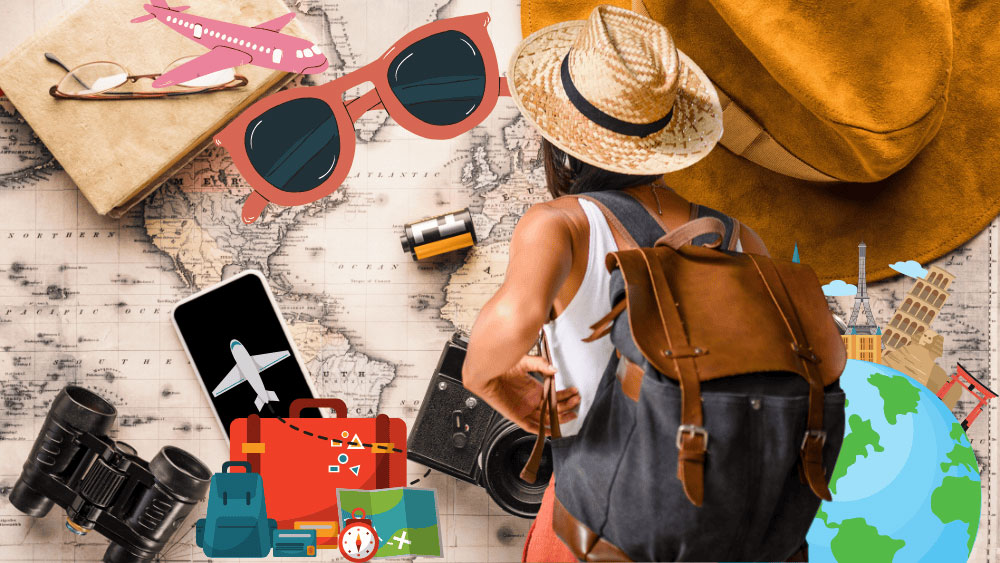
Starting a tour operating business can be an exciting and rewarding experience. However, with so many different types of tour operators out there, it can be challenging to decide which market to pursue. In this blog, we will provide guidance on the different types of tour operators available and help you choose the right market for your tour operating business.
Inbound Tour Operators
Definition of Inbound Tour Operators; An inbound tour operator is a company that specializes in organizing tours and activities within their country, working with travel agents to create packages for international visitors. They are responsible for organizing itineraries, accommodations, transportation, and activities for incoming tourists.
Their role in managing domestic tours and activities; they welcome international travelers and assist them with planning their travel to suit their needs using their country-specific knowledge.
Advantages of working with an inbound tour operator; They use their local knowledge to create a seamless, stress-free travel itinerary for their customers.
Outbound Tour Operators
Definition of Outbound Tour Operators; An outbound tour operator is a company that works with clients who are traveling outside of their home country. They offer packages that include flights, accommodations, and activities. For example, if a US resident is planning a trip to Asia, an outbound US tour operator will take care of all the details.
Their role in managing international tours and activities; They work with local travel partners in different countries to provide travelers with a complete travel experience.
Advantages of working with an outbound tour operator; They allow customers to work with someone from their home country to plan and book international travel itineraries.
Domestic Tour Operators
Definition of Domestic Tour Operators; A domestic tour operator specializes in organizing tours and activities within a specific country. They cater to locals who want to explore their own country.
Their role in managing tours and activities within a particular country; They cater to locals who want to explore their own country and have specialized knowledge on trips and activities that locals don’t often experience.
Advantages of working with a domestic tour operator; Domestic tour operators often cater to native travelers who want to experience new areas within their home country. They typically have a collection of specific holiday and weekend trips that are ideal for travelers looking to book around their work and family schedules.
Specialist Tour Operators
Definition of Specialist Tour Operators; A specialist tour operator is a company that focuses on a specific niche or interest. They create packages that cater to travelers with specific interests or needs. Some examples include adventure, luxury, cultural, or wildlife travel.
Their role in managing niche travel experiences; They specialize in creating tour packages that match travelers with experiences that they are particularly interested in or wanting to learn more about. They work with local partners to create these unique offerings.
Advantages of working with a specialist tour operator; They offer tour packages specifically crafted for different interests and often allow the traveler to learn more about their destination than other options.
Ground Operators
Definition of Ground Operator; Similar to domestic operators, ground operators work on travel itineraries within their home country. The difference is that they specialize in providing local services on behalf of other travel agencies and operators to the clients throughout their trip.
Their role in managing tours and activities; They work with travel agents to create customized travel itineraries for groups and individual travelers. Their services may include directly taking care of a client’s transportation, accommodations, meals, and activities during their trip.
Advantages of working with a ground operator; They provide a high level of support and assistance throughout the trip, ensuring that everything runs smoothly and according to plan.
Conclusion:
In conclusion, choosing the right market for your tour operating business depends on your interests, expertise, and resources. Whether you choose to specialize in inbound or outbound tours, domestic or international travel, or a particular niche, there are endless opportunities to create unique and memorable travel experiences for your customers.
With the guidance and support of TripMatrix, you can start your tour operating business and pursue the market that best suits your vision and goals as well as connect with other operators. Discover how TripMatrix tour operator software is helping true operators aound the world to manage their travel business more efficient.
Recent posts
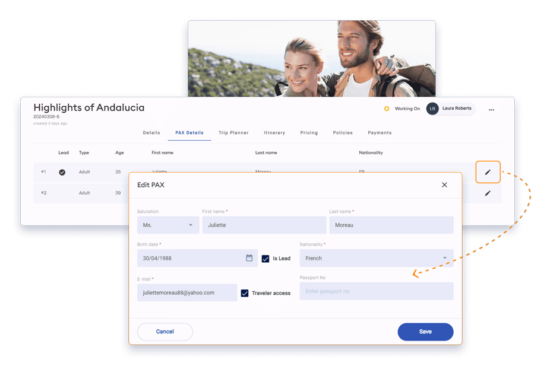
The Complete Trip Itinerary Software for Travel Agents and Tour Operators
With the rise of online travel agencies, it’s essential for travel agents to adapt their daily operations. Trip itinerary software provides everythi [...]
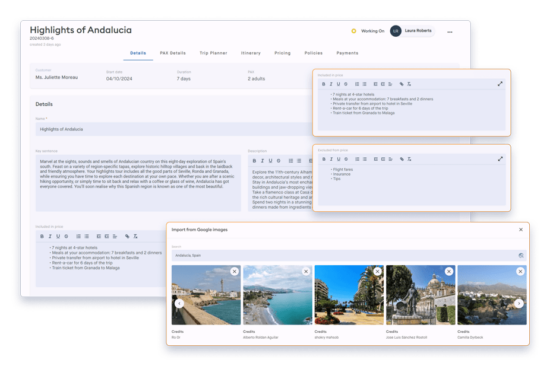
Complete Guide to Itinerary Builder for Travel Agents
TripMatrix is an all-in-one itinerary builder solution for travel agents, tour operators and DMCs. Among many benefits, itinerary builder for travel a [...]
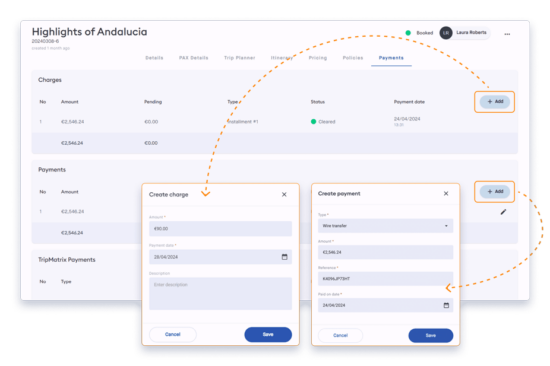
Choose the Right Travel Management Software for Your Business
While there are numerous software options available, it’s crucial to choose travel management software for your business needs. Travel management so [...]

- Business Guide
- Destination Guide
- Hotel Guide
- Places to visit
- Things to do
Tour Operator: Types, Certification, Management, and Functions

We see a variety of advertisements in day-to-day life in magazines as well as newspapers regarding a three-day or one-week tour that mentions the total cost of the package with an itinerary.
For instance, a one-week tour to Thailand under ₹ 50,000 or grab coupons worth ₹ 1000 on booking flights for Goa or heavy-off season discounts if you are headed to Fiji. These are tour package available for both individuals and groups. These tour packages are created by tour operator who has been in industry for a good amount of time.
Tour Operators
Get answers to all your questions about a tour operator.
What is a tour operator?
Working out the details of travel and pleasure takes a lot of time and effort. But as said before, it is a time-consuming process; there are travelers who want to spare the effort of planning their journeys, stays, etc. Rather they would pay someone else to do the entire arrangement. This demand led to the origin of tour operators. Today many people who like to wander and explore buy these packages as per their interests, priorities, and budget (which is always pre-determined). This package designed by the tour operator includes travel (to and fro/surface), accommodation, escort/guide, and so on. The person who puts together all these aspects of travel into a tour operator package is called a tour operator.
In general, we can say that a tour operator is a person who figures out information, plans, and co-ordinates travel with various agencies to create a package or service for the traveler. A tour operator is also responsible for the smooth conduct during the duration of the travel. Thus, tour operators can also be called tour consultants or tour coordinators.
A tour operator may or may not necessarily have their own product(s), but at the same time, they can choose to act as an intermediary to tailor a package to meet the demands/needs of the travelers.
Importance of Tour Operators

Tour operators play an important role in organizing explorations, research, and holidays. We must remember that tour operators originated when the idea of romanticized travel came into the picture.
Tour Operators provide the best and most competitive prices to the traveler. Tour operators play an important role in negotiating with tourism suppliers (such as hotels, cruises, guides, airlines, etc.) Tour Operators also buy products in bulk, getting them at discounted rates. As a result of it, travelers get the best holiday package possible.
When tourists travel to a different land, things can get uncertain, it can be a health issue, or emergency back in the homeland, or loss of documents and the need to return or maybe change their travel plans. It is important for a qualified tour operator to take care of it all. Tour Operators have good networks across the land, which helps travelers in case of emergency in the host country as well as in foreign land.
Tour Operators cater to a personalized experience based on the taste of the traveler.
Types of Tour Operators

Typically, there are four different sorts of tour providers. These are categorized based on the type of business and how it operates.
- Inbound Tour Operators
- Outbound Tour Operators
- Domestic Tour Operators
- Ground Operators
1. Inbound Tour Operators
Incoming tour operators is another name for them. Inbound tour operators are defined as businesses that welcome visitors, customers, or tourists and handle arrangements within the host nation. For instance, if TCI Ltd. arranges for a group of American tourists to go via it to India and manages the group there, TCI is referred to be an inbound tour operator.
2. Outbound Tour Operators
Outbound tour operators are those who market trips to overseas locations, whether they be for business or pleasure. For instance, if Thomas Cook handles bookings for a group of French tourists traveling to India, Thomas Cook is referred to be an outbound tour operator in the context of France.
3. Domestic Tour Operators
Domestic tour operators are those that put up included trips from various tourist attractions and market them to domestic tourists. Typically, these tour firms offer domestic travel services to tourists.
Domestic inclusive tours and independent tours are offered to tourists by domestic tour operators working inside their own country’s borders.
4. Ground Tour Operators
These types of tour operators are often referred to as handling agencies, and their primary job is to plan tours for inbound passengers on behalf of foreign operators. Consider India as an example of a country with a diverse culture.
The issue occurs when a travel operator offers beach vacations, wildlife vacations, adventure tours, and historical tours at various locations. Therefore, it is the ground operator’s responsibility to manage the arriving travelers throughout the same season but at various locations and ensure that everything runs according to the package tours or agreements.
Functions of Tour Operators

A tour operator is an organization, individual, or entity in charge of setting up the actual transportation and lodging for any tour or holiday. Additionally, they organize and run vacations by hiring, scheduling, and combining different tour elements, including accommodation, food, transportation, guides, optional excursions, and occasionally even flights.
A tour operator is similar to a service provider in that they provide holidaymakers with the easiest way to arrive, stay, and depart from a place. A tour operator controls a significant number of travel-related airlines, services, and lodging.
The following are some of the functions of tour operators:
1. Planning a tour
Planning a tour is one of the significant functions of the tour operators. Planning a tour, creating an itinerary, information about the destination, activities to do, and more are all the duties of the tour operator. A tour operator is also a tour consultant who offers his/her advice to the traveler on the basis of the interest they have, which they may choose for their next leisure or business trip.
2. Making Tour package
Tour operator buys travel components (such as flights, hotels, excursions, and more) to combine them into a package tour. They create a tour package by assembling various travel components into a final product that is sold to the tourist with a price tag of its own.
3. Arranging the tour
Travel companies create travel packages and organize tours based on visitor preferences. To give visitors/travelers the greatest experience possible, tour operators organize the trip package and numerous tourism activities.
4. Travel Information
No matter the size of the tour operators, it is always necessary to provide appropriate information to travelers. It is the most important function of tour operators to give timely updates degrading the destination, accommodation, sightseeing, immigration, health, rules, and regulation.
5. Reservation
One function that every tour operator or travel agency perform is making a reservation. A tour operator should be well connected to get the best price to make a booking, whether for hotels, flights, or entertainment activities.
6. Considering the Alternatives
Tour operators must evaluate available options to provide unique and unforgettable travel experiences. It is necessary for a tour operator to evaluate all the available options before they sell it to tourists.
7. Sales and Marketing
The only way a tour operator can make money is by selling the tour packages that they have carefully constructed, keeping in mind the traveler’s requirements. It is a salient function of the tour operator to market their packages in the right manner to generate revenue.
8. Taking Care of Problems
As said before, tour operators are also called tour coordinators who are responsible for the smooth conduct of the holiday if any problem arises. Tour operators correct the issues and offer travelers the best possible substitute during their vacation.
9. Tour Operator Certification
The highest ethical and environmental standards available are met by your operations if they have been certified by an Accredited Certification Body. The public’s concern about the negative and beneficial effects of travel and tourism is increasing, and certification offers a respectable answer to challenging environmental and social problems.
These are the following certificates that a tour operator can take to become a certified operator.
- IATA – International Air Transport Association
- PATA – Pacific Asia Travel Association
- WTTC – World Travel and Tourism Council
- IATO – Indian Association of Tour Operators
Being a tour operator is a multifaceted and exciting job. Building strong partnerships with suppliers and delivering outstanding customer service is key to success in this field. Additionally, to become and keep up with the latest trends in travel industry, tour operator training is provided by many organizations and education centers. Tour operators should ensure to enrol in these programs and use technology to their benefit.

Tour Operators FAQs
What is the main role of a tour operator.
A tour operator is a member of the hospitality industry that plans tours and offers assistance to clients, and ensures they have a comfortable time. Based on their financial situation and personal preferences, these experts provide consumers with advice on various travel packages.
Why does one need a tour operator?
They personalize the tour and ensure that every detail is taken care of. Everything from the airport to hotel transfer, meet and greet, hotel check-in, meals, transportation to the trade show, sightseeing, and other activities are scheduled to make the most of your time and money spent with them.
How do I start a tour and travel business?
Starting a tour and travel business can be an exciting and rewarding venture. Here are some steps to help you get started: – Know Your Business. – Determine Target Market. – Analyze Competitors. – Set Goals. – Outline Strategies. – Set a Budget. – Get to Work.
Subscribe for Latest Updates
Check your inbox or spam folder to confirm your subscription.
Leave a Reply Cancel reply
Your email address will not be published. Required fields are marked *
Save my name and email in this browser for the next time I comment.
Talk To Us!
Latest posts.
- Find The Best Area to Stay in Washington, DC: 4 Ideal Locations
- Discover Cook Islands: Untamed Beauty of Tropical Coastlines
- Top Things to Do in Bahrain: Activities, Nightlife, Food, Shopping, and Events
- Top-Notch Luxury Activities in Thailand: Experiencing the Unusual
- Experience Fun Splash at Yas Waterpark in Abu Dhabi

How tour operators can make a positive economic impact on a destination
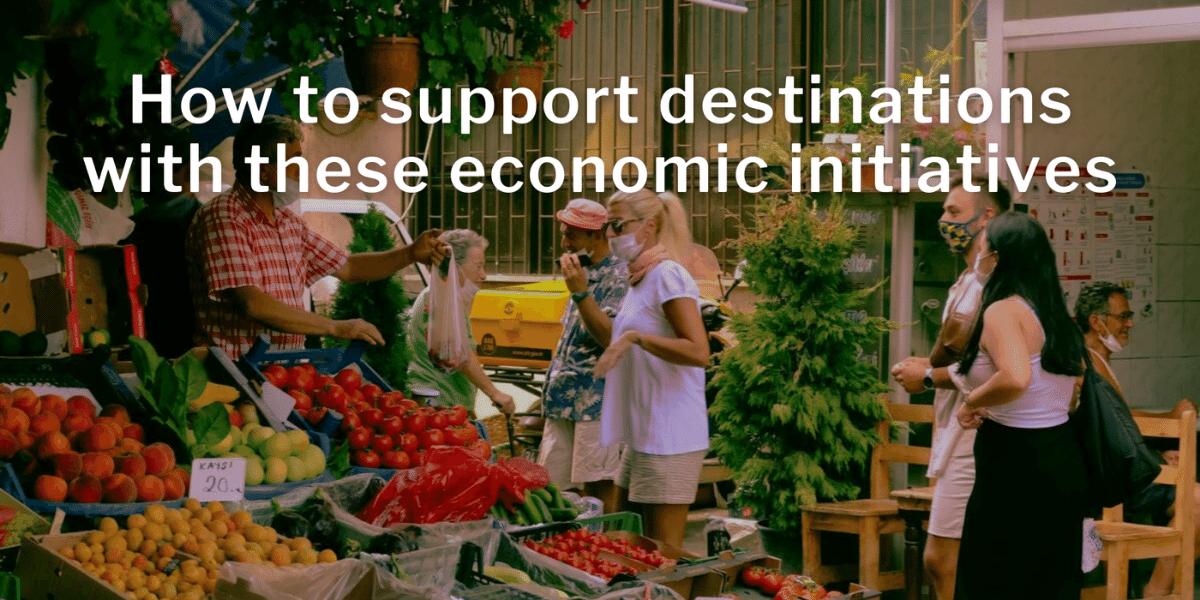
Tourism is now one of the world’s largest industries and one of the fastest-growing economic sectors. Globally, travel and tourism’s direct contribution to GDP was approximately 4.7 trillion U.S. dollars in 2020. For many countries, tourism is seen as the main instrument for regional development as it stimulates new economic activities.
Economic sustainability, one of the three pillars of sustainability, refers to practices that support long-term economic growth without negatively impacting the social, environmental, and cultural aspects of a community. Although this pillar can have a positive economic impact on the balance of payments, employment, gross income and production, it may also have negative effects, particularly in the form of leakage.
Tourism leakage occurs when the revenue generated by tourism is lost to outside economies. The cumulative effects of actions like buying an imported souvenir and staying in a foreign-owned hotel can amount to significant losses for the local economy on which your tour operations depend. Unfortunately, leakage is the highest in developing nations, but it is present at any destination.
The following are some key statistics about economic sustainability:
- 42% of travellers shopped at small, independent stores to support the local economy during their travels.
- 70% of money spent by tourists leaves the country
- In Fiji, it is estimated that 60% of the money earned through tourism ends up leaving the island nation.
- According to the UNEP (United Nations Environment Programme), for every $100 spent by a tourist on a holiday to a developing country, only $5 remains in the host community.
- Tourism leakage estimates range from 40% in India to 80% in the Caribbean.
- Non-star rated hotels (likely locally owned) only result in an 8.8% leakage .
Like most complex issues, the issue of tourism leakage is not black and white. However, to help get you started, we’ve outlined a few initiatives that tour operators can take to ensure that the expenses from the travel you offer benefit the destination and the communities your customers are visiting.
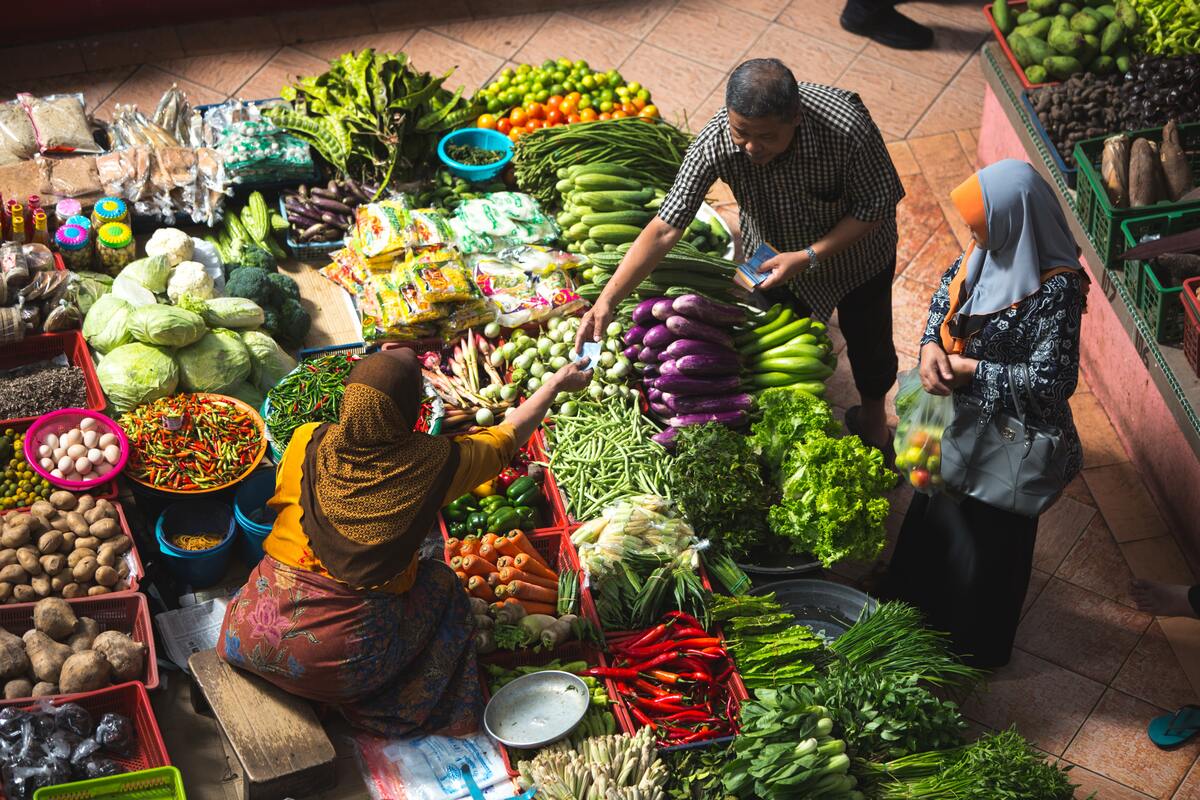
local veggie market
Encourage the purchase of local products and services
By choosing to support local products and services, you decrease the leakage and engage in sustainable tourism. A few ways to do this are by seeking out locally-owned restaurants serving local fare, hiring local tour guides and staying in locally-owned accommodation. The more local businesses you can support, the less leakage occurs.
Plan excursions and tours during the off-season
Many businesses, hotels, and excursions that operate off-season employ permanent residents. At a time when the destination may need the money most, your money supports the local economy. The income of permanent residents contributes to a diversified and healthy economy throughout the year.
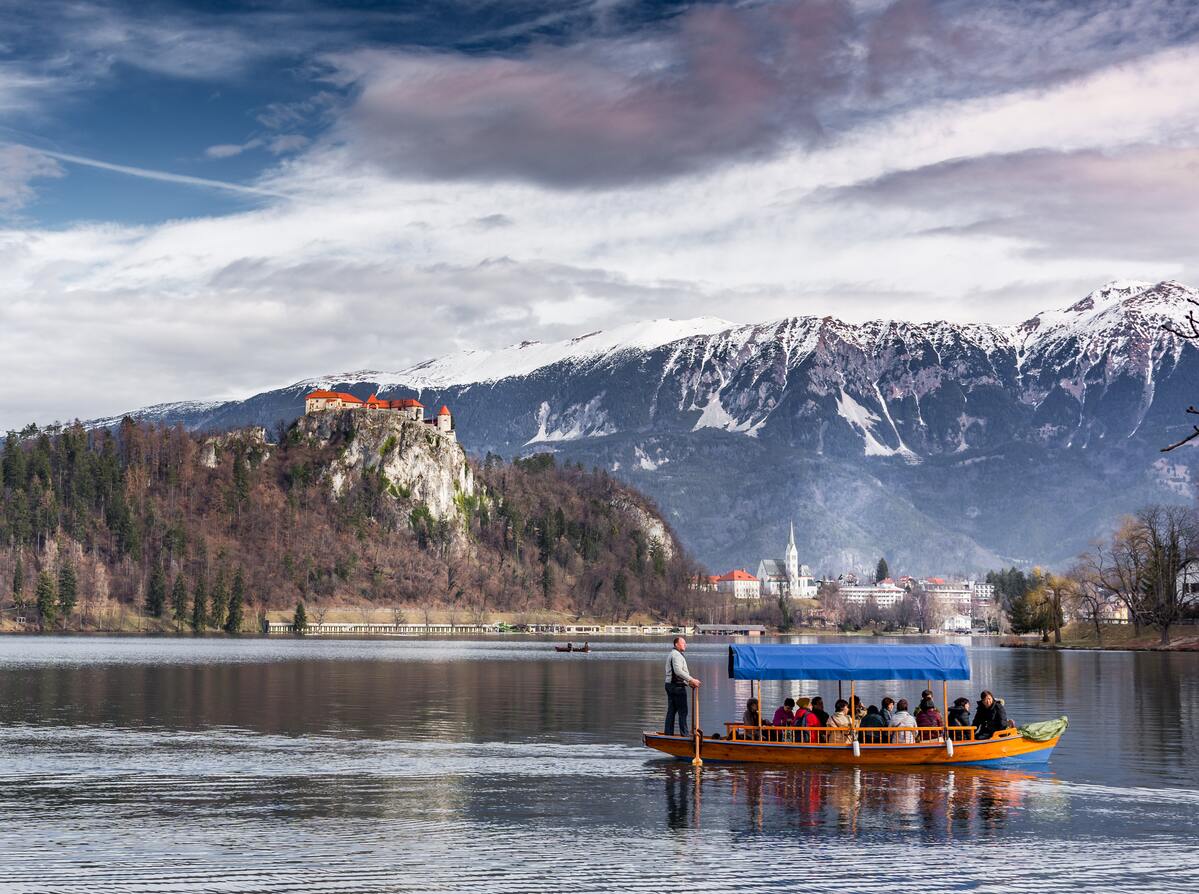
Donate to help local causes and initiatives
Donating to local projects is a great way to support the local economy in addition to buying from and employing locals. In each destination you offer, you can choose to support a local project and donate a fixed amount per traveller or tour group. However, donating does not always mean giving money. You can also donate time or materials and the projects can be both social and environmental. Consider supporting a local hospital, school, or women’s empowerment center. Additionally, you can support a local wildlife sanctuary, vegetable garden, or take part in a tree planting project.
Employ local workers
One of the easiest ways to directly stimulate local employment in tourism is to hire local workers. In addition to supporting the local economy, you will also add value to your travel experiences since locals are very familiar with their country, its history, people and culture. As the link between the destination and the traveller, they are able to transform an activity into a memorable experience.
Limit the number of all-inclusive hotels
All-inclusive travel, a type of travel where tourists purchase a travel package that includes everything they need from transport to food, drink and entertainment, is aimed at encouraging travellers to stay put. This type of tourism, also known as enclave tourism , directly impacts the local economy because travellers don’t feel the need to explore the local community and support them through their purchases. This results in very little money reaching the destination, where the tourism is taking place. To avoid this, stay at locally owned boutique accommodation or resorts, hire local taxi services or bike rentals and dine with locally-owned restaurants.
As a tour operator, you have the opportunity to decide where your money and that of your travellers ends up. You can ensure a destination directly benefits from tourism by spending your money locally and with the right people. It gives locals the chance to do business, boost economic growth, and the empowerment to be more independent. We encourage you to take action towards better travel . It will undoubtedly have a positive impact on the communities in which you offer tours and on the locals who live there.

Seal the Deal: Customer Care for Luxury Tour Operators.
We all know to secure bookings as luxury tour operators, exceptional customer care that attentively addresses clients’ unique needs is essential. Tour operators can stand out and foster enduring relationships by adopting focused, detail-oriented strategies that cater to the discerning luxury clientele.

Time management for Tour Operators.
As a tour operator, managing time efficiently is not just a goal, it’s an essential part of your business model. In an industry where customer satisfaction and tailor-made experiences are paramount, juggling between various tasks – from itinerary planning to customer service – can be daunting. However, with the right strategies and tools, this challenge can be transformed into your greatest asset.

Tour operator software: How the right stack can drive growth.
In the fiercely competitive luxury travel industry, choosing the best software for your tour operator business can significantly transform the efficiency of your travel agent operations.

How does the travel industry actually work?
Who are the key players in the industry, where do they all fit together and how does the industry actually work?! There’s no doubt that the travel industry is a confusing space to wrap your head around so we’ve broken it down for you in this easy new resource.
10 distribution channels your tours and experiences business should be using

By Rezdy — 30 Aug 2018
distribution marketing tour operator tourism business strategy
Updated May 2023 – As a tour operator, bookings are your bread and butter. By maxing out your sessions and having high steady levels of bookings all year round, your business will flourish. However, achieving this goal isn’t always easy. It’s even more challenging when you solely rely on one distribution channel.
When it comes to examples of distribution channels in the tourism industry, many operators automatically assume that online travel agents (OTAs) are the only form of resellers available. However, this isn’t the case. Travel distribution channels come in a variety of different types of resellers and distribution strategies. By diversifying your distribution channels and understanding what the main types of tourism distribution channels are, you can maximize your visibility and attract a wider range of potential customers.
In this article, we’ll explore 10 types of distribution channels in the tourism industry that tour operators can use to reach new customers and increase bookings.
Why it’s important to target the right distribution channels
For many tourism businesses, broadening your distribution channels is a smart way to elevate your tourism marketing strategy. By delivering your products via different streams and using valuable third-party integrations, you’re expanding your reach to a bigger pool of potential customers.
Distribution channels are all the different ways that your services get delivered to your customers. There are many types of distribution channels in the tourism industry. A distribution channel can be a direct booking via your website or through third-party resellers within the tourism industry. To put it simply, any platform where your services can be turned into a transaction is considered a distribution channel.
Top 10 distribution channels
As a tour and activity operator, choosing the right distribution channels can greatly impact your business’s success. Below, we’ll take a closer look at 10 of the main distribution network partners in travel and tourism, along with the benefits of each one.
By understanding what the main types of tourism distribution channels are, you’ll be able to make an informed decision when forming partnerships with distributors and finding the right resellers for your products and services.
1. Your website

Don’t underestimate the power of your own website. Unlike other distribution channels, you remain in control of branding and customer experience during the booking process on your website. This enables you to take advantage of booking trends and more accurately finetune your messaging so that it is well received by customers.
Your website also has a direct impact on your business’s reputation. A professionally branded website helps foster trust and authority within the marketplace. Customers will be more willing to book directly through your website if they are welcomed by a mobile-optimized website that enables a seamless booking experience. When supported by a strong SEO strategy, your website can dramatically boost customer impressions of your website and increase overall engagement.
Tip: When it comes to content, quality always trumps quantity. Don’t fall into the trap of stuffing your blog and website pages with long keywords or boring content. Rather, scatter in relevant keywords and create content that matches the user’s intent when searching for the keywords you are targeting.
2. Online travel agencies (OTAs)
Online travel agencies are one of the biggest players within the chain of distribution in travel and tourism. There are heaps of top online travel agencies you can partner with. These include big names such as Tripadvisor, Expedia, and Viator to name a few. By partnering with OTAs, you can reach a wider audience, regardless of whether you are an inbound or outbound tour operator.
OTAs are one of the most popular travel distribution channels as their websites gain millions of visitors every day. OTAs appeal to travelers as it’s a one-stop shop for both travel and tourism products. By being able to compare the prices of these travel products and book all of them at once, it provides travelers with an easy booking process. And with the majority of customers now booking on their mobile devices, OTAs have made their booking process a lot easier by building their own applications.
Furthermore, with the help of their strong domain authority, OTAs rank at the top of search engine results – making your services quicker and more accessible for customers to book.

Tip: The competition on OTA websites is tough. Be sure to display professional-looking photos and videos that showcase your services. Well-written tour descriptions will also go a long way.
3. Tourist information centers
Almost every major city has visitor information centers (or VICS). These centers are a place for travelers to enquire about everything related to the area. From accommodation, tours and activities, transportation, or simply suggestions on things to do. VICS will help visitors in suggesting and organizing itineraries and travel arrangements based on their preferences.
Partnering with VICs helps boost the perception of your business as VICs usually hold an authoritative position in the customers’ eyes. They’re perceived as a trusted source and will most likely trust your business for being affiliated with VICs. It’s for this reason that visitor information centers are great to partner with to broaden your distribution channels in travel and tourism.
Tip: Some VICs don’t ask for commission for bookings that they send to you, while others have a pricing structure to list on their site. Make sure you do your research before you decide to partner with a VIC in your travel distribution channel strategy.
4. Your partner network
Your partner network can include Destination Management Organizations (DMOs), local governments, vendors, hotel concierge services or even other tour operators.
Local government websites, for example, often promote different travel businesses and experiences for tourists visiting a specific location. For example, Tourism Australia helps promote events and businesses every month by featuring them on their monthly e-guide, The Hot List. The Hot List is filled with the latest activities, events, and things to do in Australia and is published each month with new suggestions.
To expand your business’s travel distribution channels through partner networks, you can simply approach relevant businesses or organizations and enquire about promotional opportunities or partnerships.
Tip: Travel networking events and tourism conferences are great places to build mutually beneficial partnerships with other businesses.
Google manages a variety of tools that can be employed to increase your business’s online visibility. Two of the most useful tools offered by Google that have significantly enhanced the chain of distribution in travel and tourism are Google Business Profile and Google Things to do .

By creating and optimizing a free business profile on Google, companies can encourage more lead generation and boost their visibility for local searches. Business profiles are also valuable when fostering customer engagement as they are open for customers to leave reviews, ask questions, and submit relevant photographs.
Google Things to do is another free tool that can increase your business’s visibility and allow you to connect with potential customers. This search experience is designed specifically for tour, activity, and other attraction providers looking to increase their distribution channels in travel and tourism. By using Google Things to do, businesses can more seamlessly convert relevant Google searches into direct bookings.
Tip: When managing your Google Business Profile, it’s important to check it every week or so to ensure that contact details are up to date and that customer queries are answered without delay.
6. Destination websites
The travel and tourism industry has a significant impact on economies worldwide. With this in mind, it’s no surprise that many governments have taken notice and responded by providing support to local tourism businesses.
Many local, state and national governments have recognized the power of the tourism industry by creating destination websites to promote their area to potential visitors. These websites offer a wealth of information on local attractions, events, and accommodations. They may also feature package deals that include tours, activities, and other services.
As a tour or activity provider, you can benefit greatly from working with these destination management organizations. By offering your services as part of their packages, you can tap into a wider audience of potential customers. This can be especially valuable for businesses looking to attract international travelers who may not be familiar with the local area.
Tip: When reaching out to destination websites, it’s important to do your research first. Take the time to understand their audience, the type of content they feature, and the services they promote. This will help you tailor your pitch and ensure that your tours and activities align with their brand and messaging.
7. Daily deal sites
Who doesn’t love a bargain? Vouchers and daily deal sites like Groupon and Living Social can be a valuable distribution channel for your tour or activity business. These sites offer a platform to reach budget-savvy travelers who are always on the lookout for unique and affordable experiences.
When utilizing daily deal sites, it’s important to create a compelling offer that provides value to the customer while still generating revenue for your business. Consider offering a discounted rate on an activity package or bundling services for a more attractive deal.
However, it’s essential to limit the number of vouchers that can be sold to avoid
overbooking and ensure a high-quality experience for all customers. Additionally, be sure to set clear expiration dates and redemption instructions to avoid any confusion or frustration among customers.
Tip: Daily deal sites can be especially useful during low-season travel periods and when you have remaining slots to fill up. By carefully crafting your promotion and utilizing this distribution channel, you can attract new customers and generate additional revenue for your business.
8. Hotel concierges

While traditional, working with hotel concierges is a highly effective distribution channel for tour and activity operators. By collaborating with hotels and accommodation centers, you can reach a wide range of potential customers who are looking for things to do during their stay.
This strategic partnership is particularly useful for providing opportunities to maximize last-minute bookings. Many travelers prefer to plan their activities after arriving at their destination, and featuring your services at hotels can help you capture those customers. By making it easy for guests to book your tours and activities through the hotel, you can increase your chances of securing those last-minute bookings.
Another key benefit of working with hotels and accommodation centers is the reduced competition. Hotels naturally have a reputation to maintain, and they typically only refer their guests to a handful of trusted and professional tour operators. Building a strong relationship with hotels through providing exceptional service can secure your business’s place as one of their preferred partners.
Tip: To effectively work with hotels and accommodation centers, you must first develop a professional and trustworthy reputation. Make sure your tours and activities are high-quality, and prioritize providing exceptional customer service. You can also make it easier for hotels to refer their guests to your businesses by providing them with promotional materials such as brochures and flyers.
9. Retail travel agents
Retail travel agents can be a valuable distribution channel for tour and activity operators. These agents have an established customer base of travelers who are looking for assistance with planning their itineraries. By working closely with local travel agents, you can promote your tours and activities on a personal level to their customers.
One significant benefit of partnering with retail travel agents is that they offer personalized services that cater to their customers’ needs and wants. They have the ability to book multi-day tours, flights, private charters, and other services that complement your tours and activities. This personalized touch can be an excellent selling point for your business and can help you stand out from your competitors.
Another advantage of working with retail travel agents is that they offer consistency in incoming bookings. Their customers are often repeated customers who trust their agent’s recommendations and rebook their services through them. This provides a reliable source of bookings for your business and helps to ensure a steady stream of revenue.
Tip: To successfully work with retail travel agents, it’s essential to build and maintain strong relationships with them. Be sure to provide them with high-quality marketing materials, such as brochures and flyers, that showcase your tours and activities. You can even consider offering incentives or commissions for each booking they make on your behalf. These small gestures can go a long way in building a lasting partnership with retail travel agents.
10. Social media

Social media platforms such as Facebook, Instagram, Twitter, and LinkedIn can be an effective distribution channel for your business. With billions of users worldwide, social media platforms provide you with a massive audience to promote your services. By creating a social media marketing strategy that includes relevant hashtags, quality content, and engaging visuals, you can increase your brand visibility and reach a wider audience.
Social media has also become a key platform for customer engagement and communication. Customers expect brands to have a social media presence, and they often turn to social media to ask questions, provide feedback, or voice their concerns. By actively monitoring your social media channels and responding promptly to customer inquiries, you can build trust and loyalty with your audience.
Additionally, social media allows you to target specific audiences through paid advertising. With social media advertising, you can create highly targeted campaigns that reach the right people at the right time. For example, you can target users based on their location, interests, age, gender, and more. This can be a highly effective way to reach new customers and drive conversions.
Tip: Social media is a constantly evolving platform, and what works today may not work tomorrow. It’s essential to stay up to date with the latest social media trends, algorithms, and best practices to ensure that your social media marketing efforts remain effective.
Managing your distribution channels
Working with the main distribution channels in travel and tourism sure has its benefits, but it does come with added work. Connecting with them also comes with a set of challenges. Joining a tour operator marketplace and choosing the right channel manager can help alleviate the stress of setting up your travel distribution channels.
For instance, Rezdy Channel Manager is a marketplace platform designed specifically for tour operators. Through Rezdy Channel Manager, you’ll be able to connect with thousands of resellers and build your distribution channel with a click of a button.

Rezdy’s Marketplace platform simplifies the overall reselling process into 3 simple steps: 1. List your products 2. Set your commission rates 3. Let thousands of agents and resellers resell and promote your products
The good news is that if you’re already a Rezdy booking software customer, you instantly have access to Rezdy Channel Manager. Allowing you to benefit from the best of both worlds – an advanced booking system that will simplify your processes and the ability to instantly connect and manage thousands of resellers from one central system.
Ready to take the step to boost your bookings with Rezdy? Start a FREE 21-day trial or book a demo today.
If you enjoyed this article then make sure to subscribe to the Rezdy newsletter, where you’ll receive up-to-date learnings from the experiences industry, straight into your inbox.
Start your free trial today
Enjoy 21 days to take a look around and see if we are a good fit for your business.
No obligations, no catches, no limits, nada
Distribution
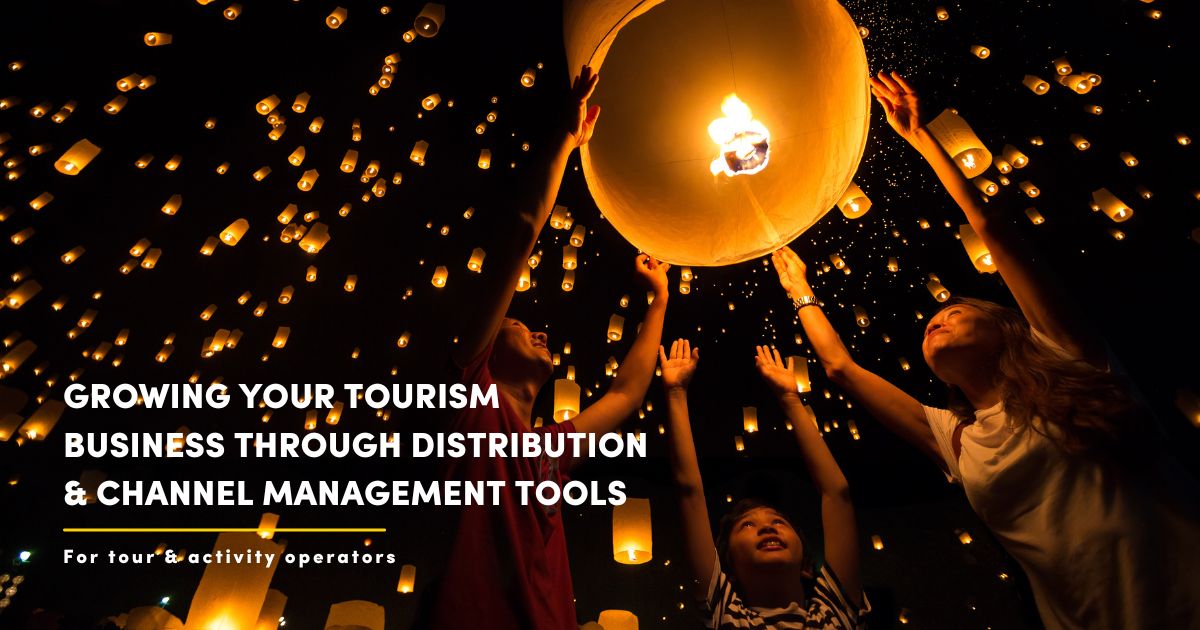
eBook: Guide to growing your tourism business through distribution & channel management tools

How to navigate API connections with resellers
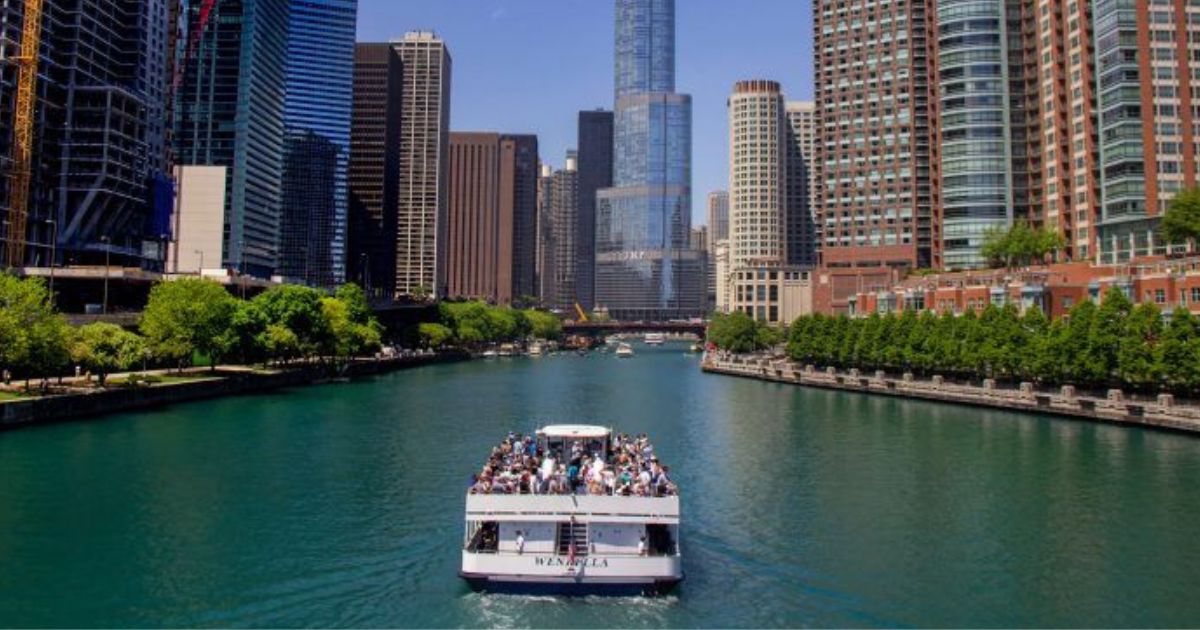
Case Study: Wendella Tours & Cruises

Tour Operators: Types, Functions, Importance, Difference
- Post last modified: 19 January 2023
- Reading time: 18 mins read
- Post category: Uncategorized
What is Tour Operator?
Tour operators are sometimes called wholesalers but this is partially true because a wholesaler buys goods or services in bulk at his own account to prepare a tour package and then retails it through the travel agencies or directly to the clients.
Table of Content
- 1 What is Tour Operator?
- 2.1 Inbound Tour Operators
- 2.2 Outbound Tour Operators
- 2.3 Domestic Tour Operators
- 2.4 Destination Management Companies
- 3.1 Planning a Tour
- 3.2 Making Tour Package
- 3.3 Arranging a Tour
- 3.4 Travel Information
- 3.5 Reservation
- 3.6 Travel Management
- 3.7 Evaluate the Option Available
- 3.8 Promotion
- 3.9 Sales and Marketing
- 3.10 Taking Care of Glitch
- 4 Importance of Tour Operators
- 5.1 Tour Packages Creation
- 5.2 Make Travel Arrangements in Advance
- 5.3 Tour Operations Budgeting
- 5.4 Providing a Relaxed and Safe Tour
- 6 Difference between Travel Agent and Tour Operator
However, a tour operator who has his own one or more tourist product components formulates a new tourist product for example ‘inclusive tours’. Tour Operators generally offer a variety of package tours to cater to the needs of different kinds of travellers.
An organization, firm or company which buys individual travel components, separately from their suppliers and combines them into a package tour, which is sold with their own price tag to the public directly or through middlemen is called a tour operator.
More precisely, tour operators are mainly responsible for delivering and performing the services specified in a given package tour. They can provide these services themselves as some have their own cars and coaches, hotels and other travel-related services or can obtain these from other suppliers. That is why they are called manufacturers of tourism products.
Types of Tour Operators
Following are the types of tour operators explained briefly:
Inbound Tour Operators
Outbound tour operators, domestic tour operators, destination management companies.
These are also known as incoming tour operators. Technically, the operators who receive guests, clients/tourists, and handle arrangements in the host country are called inbound tour operators.
For example, a group of American tourists coming through TCI to India and the company makes arrangements and handles the group in India, then TCI is called an inbound tour operator. Incidentally, the inbound traffic to the country for the last two decades has been decreasing.
Essentially, tour operators need to adopt innovative marketing strategies and should introduce special interest tours to cater to the special needs of foreign tourists.
Tour operators, who promote tours to foreign destinations, maybe business tours or leisure tours are called outbound tour operators. Indian outbound tourist traffic is growing at a rate of 10 percent annually and this makes India the second-largest country in the world with regard to the travelling population.
However, India’s outbound tourism is not only holiday-oriented but it is business-oriented too. There are many travel companies that offer outbound packages such as SITA, TCI, Thomas Cook etc.
Domestic tour operators are those who assemble and combine tourist components into inclusive tours and sell them to domestic travellers. In general, these tour operators provide travel services within the boundary of the home country and offer package tours to travellers viz. domestic inclusive tours or independent tours.
These are commonly known as handling agencies and their main function is to organize tour arrangements for incoming tourists on behalf of overseas operators. When a tour operator himself promotes beach holidays, wildlife holidays, wildlife tours, heritage tours, cultural tours at different places, difficulty arises.
It is the ground operator who handles the incoming travellers in the same season but at different places and ensures that the entire operation is according to the package tours or agreements.
Sometimes when a handling agency is at a prominent tourist place, for example, Delhi and it has to make arrangements to Goa, then it contracts (if it has no office of its own) with a local operator (known as an excursion agent) to handle the arrangements on his behalf.
Functions of Tour Operator
A tour operator is like a service provider, providing the most convenient option for tourists to stay, visit, as well as leave the city. A tour operator owns a high volume of travel services across carriers, services, and accommodation. Some most important functions of the tour operators are following:
Planning a Tour
Making tour package, arranging a tour, travel information, reservation, travel management, evaluate the option available, sales and marketing, taking care of glitch.
The most important function of the tour operators is planning a tour. Tour operators plan a tour and make a tour itinerary that contains the identification of the origin, destination and all the stopping point in a traveller’s tour.
A prospective tour operator also gives advice to intending tourists in various types of tour programmes, which they may choose for their leisure or commercial travel.
Tour operator buys individual travel components, separately from their suppliers and combine them into a package tour. Tour operators make tour package by assembling various travel components into a final product that is called a tour package which is sold to tourists with their own price tag. Making tour packages is also an important function of the tour Operator.
Tour operators make tour package and also arrange a tour according to tourist demands. Tour operators arrange the tour package and various tourists activities to provide the best experience to tourists/travellers.
Whatever the size of tour operators, it has provided necessary travel information to the tourists. This task is utterly difficult and very complicated. A tour operator must give up-to-date, accurate and timely information regarding destinations, modes of travel, accommodation, sightseeing, immigration, health and security rules about various permits required to travel in a particular area etc.
It is a very important function of all types of tour operators and travel agencies. Tour operators make all the reservations by making linkages with the accommodation sector, transport sector and other entertainment organizations to reserve rooms, and seats in cultural programmes and transportation.
Tour operators manage tours from the beginning to the end of the tour. A tour operator has the responsibility to look after the finer details of a vacation or tour such as hotel, accommodation, meals, conveyance etc. Tour operators provide travel guides, and escorting services and arrange all travel-related needs and wants.
Tour operators evaluate all available options to provide a unique or unforgettable travel experience to tourists during their journey. Tour operators evaluate the various options available for a tour package and provide the best of them to tourists.
Tour Operators makes tour packages and promote them into various tourists markets at domestic as well international level. Tour operators promote a travel destination to attract a large group of tourists at the domestic as well as international level.
In the promotion of tourist destinations, tour operators play a key role. Travel agencies or tour operators are called image builders of a country.
Tour operators do sales and marketing of tourist products. Tour operators buy individual travel components, separately and combine them into a tour package, which is sold with their own price tag to the public directly. Tour operators do the marketing of tourist destinations and tourism products to attract the attention of tourists/travellers.
Tours operators are also called handling agencies that handle tour package and take care of all the glitches and problems that arise during a tour package. Tour operators fix the glitches and provide the best available alternative to tourists during their journey.
Importance of Tour Operators
- Tours operators play a key role in the tourism sector. Tour operators create tourist product, promote them and finally sold them to tourist.
- Tour operators provide the best and competitive price to the tourist. Tour operators negotiate with suppliers of tourism product such as hotels, airlines and provide the best possible price to the tourist.
- Tour operators buy tourist product in bulk and get huge discounts from suppliers. So that they can provide tourist’s products at cheap price.
- Tour operators organized a tour in the best way. They personalize and make sure each and every component of the tour is well-taken care. Tour operators provide best travel experience during a tour. Tour operators save tourist’s times and money.
- Tour operators provide immediate support system at host country as well as foreign land. When tourists travel to a foreign land and things get uncertain, maybe it’s a health or loss of documents and need to return back or change of travel plan. A qualified tour operator takes care of all these unseen events with efficiency.
- Tour operator caters to the needs of tourists on the based on their taste of travel. Tour operator provides all the best available option according to tourist needs and demands.
Role of Tour Operators in Tourism Business
Tour packages creation.
The tour operator is in charge of developing and maintaining guests’ tour packages. The preparation of activities that appeal to the specific visitors embarking on the trip is part of tour package management. When and how to adjust a tour package to best adhere to the group or individual’s goals should be covered by the tour operator.
Make Travel Arrangements in Advance
In most circumstances, tour operators are responsible for making travel arrangements for the touring group. This covers transportation from one location to another, as well as ensuring that all members of the group arrive at their next destination. Tour operators frequently assist with flight tickets and collaborate closely with hotels to recommend lodging reservations, sightseeing alternatives, and other activities to group members.
Tour Operations Budgeting
Tour operators work hard to build tour packages that provide users with great service at a lower cost than if they booked each commodity separately, while still running a profitable business. Tourists purposefully seek out the assistance of a travel agent or tour operator in order to get more value for their money. Before finalising a tour package, tour operators should take the time to evaluate pricing.
Providing a Relaxed and Safe Tour
A tour should fulfil all of a traveller’s expectations and beyond. A tour operator should be skilled at putting together an experience that will leave guests with lifelong memories.
It’s just as crucial to providing a meaningful, good experience as it is to keep your passengers safe throughout the journey. Some tour activities may represent a possible risk to travellers, putting the tour organisation at risk. As a tour operator, you should encourage your visitors to purchase travel insurance. Insurance will give you and the tourists peace of mind as they go on once–in–a–lifetime experiences. Travel Agency & Tour Operators Roles & Responsibilities
Difference between Travel Agent and Tour Operator
There is a lot of confusion about the difference between tour operators and travel agents what exactly makes them different. The main difference between a Travel agent and a Tour operator are following as:
- A travel agent is a person who has a full knowledge of tourist product – destinations, modes oftravel, climate, accommodation and other areas of the service sector. He acts on the behalf ofthe product providers/principals and in return get a commission.
- Tour operator is an organization, firm or company who buys individual travel components,separately from their suppliers and combines them into a package tour, which is sold withtheir own price tag to the public directly or through middlemen.
- Tour operators are like wholesalers and travel agents are the retailers.
- A tour operator makes the package holidays up and the travel agents sell them on.
- Tour operator taking up the bulk of the responsibilities and his fee is obviously much greaterthan a travel agent.
- A tour operator has the responsibilities to look after the finer details of a vacation or tour suchas hotel, accommodation, meals, conveyance etc.
Please Share This Share this content
- Opens in a new window X
- Opens in a new window Facebook
- Opens in a new window Pinterest
- Opens in a new window LinkedIn
- Opens in a new window Reddit
- Opens in a new window WhatsApp
You Might Also Like
What is savoury types, dishes, service, monuments of andhra pradesh, buffet flower arrangement, types of bar, communication skills in customer service, customer service skills: qualities, maximize satisfaction, telephone etiquette, leave a reply cancel reply.
Save my name, email, and website in this browser for the next time I comment.
Novokuznetsk
Demographics, city administration, administrative and municipal status, administrative bodies, transportation, twin towns and sister cities, notable people, external links.
It was previously known as Kuznetsk until 1931, and as Stalinsk until 1961.
Founded in 1618 by men from Tomsk as a Cossack ostrog (fort) on the Tom River , it was initially called Kuznetsky ostrog ( Кузне́цкий острог ). [2] It became the seat of Kuznetsky Uyezd in 1622. [3] Kuznetsk ( Кузне́цк ) was granted town status in 1689. [3] It was here that Fyodor Dostoevsky married his first wife, Maria Isayeva in 1857. [13] Joseph Stalin 's rapid industrialization of the Soviet Union transformed the sleepy town into a major coal mining and industrial center in the 1930s. It merged with Sad Gorod in 1931. From 1931 to 1932, the city was known as Novokuznetsk and between 1932 and 1961 as Stalinsk ( Ста́линск ), after Stalin. As a result of de-Stalinization , it was renamed back to Novokuznetsk .
As of the 2021 Census , the ethnic composition of Novokuznetsk was: [14]
Within the framework of administrative divisions , Novokuznetsk serves as the administrative center of Novokuznetsky District , even though it is not a part of it. [1] As an administrative division, it is incorporated separately as the Novokuznetsk City Under Oblast Jurisdiction —an administrative unit with the status equal to that of the districts . [15] As a municipal division , Novokuznetsk City Under Oblast Jurisdiction is incorporated as the Novokuznetsky Urban Okrug . [15] [16]
The city consists of six non-municipal intra-city districts : [16]
On 7 December 2009, by a resolution of the Novokuznetsk City Council of People's Deputies, a new version of the City Charter was approved, [16] according to which the authorities consist of:
- Novokuznetsk City Council of People's Deputies (representative authority),
- Mayors of the city of Novokuznetsk,
- Administration of the City of Novokuznetsk (executive and administrative authority),
- City Control Committee (permanent body of financial control),
- Judicial institutions: district courts, courts of general jurisdiction, the Russian Agency for Legal and Judicial Information, the permanent judicial presence of the Kemerovo Oblast Court, judicial divisions of magistrates, and others. [18]
The Novokuznetsk City Council of People's Deputies is a representative body of power and consists of 18 deputies elected in 18 single-mandate constituencies and 18 deputies elected on party lists. The term of office of deputies is five years.
In September 2021, elections were held for the Council of People's Deputies, following which the seats in the council were distributed as follows: 27 - United Russia , 2 - Liberal Democratic Party , 2 - A Just Russia , 2 - Communist Party . The representative of United Russia, Alexandra Shelkovnikova, was elected chairman.
The Youth Parliament of the city operates under the City Council of People's Deputies. [19]

A whole network of bodies of territorial public self-government has been created in Novokuznetsk; [20] in total, 60 of them have been created in the city: in the Zavodskoy District - 7, Kuznetsky - 6, Kuibyshevsky - 13, [21] [22] [23] Novoilyinsky - 6, Ordzhonikidzevsky - 9, Central - 16.
- Siberian State Industrial University
- Novokuznetsk branch of Kemerovo State University
- State Institute for Physicians Postgraduate Training (also known as Novokuznetsk Postgraduate Physician Institute), Russian Ministry of Health
- Novokuznetsk Scientific Center of Medicosocial Expert Evaluation and Rehabilitation of Invalids, Federal Agency for Public Health and Social welfare
- Institute of General Problems of Hygiene and Occupational Diseases, Russian Academy of Medical Sciences
- Kuzbass institute Federal Penitentiary Service
Novokuznetsk is a heavily industrial city and is located in the heart of the Kuzbass region . Factories in the city include:
- West-Siberian Metal Plant
- Novokuznetsk Iron and Steel Plant
- Kuznetsk Ferroalloys [ ru ]
- Novokuznetsk aluminium factory [ ru ]
Metallurg Novokuznetsk is an ice hockey team based in Novokuznetsk. Formerly a member of the Kontinental Hockey League , the team is currently a member of the Supreme Hockey League . The football team of the same name was recently promoted to the Russian first division below the premier.
RC Novokuznetsk compete in the Professional Rugby League , the highest division of rugby union in Russia.
Florida Panthers goaltender Sergei Bobrovsky , Carolina Hurricanes defenseman Dmitry Orlov and Minnesota Wild winger Kirill Kaprizov were all born in Novokuznetsk and began their pro careers with Metallurg Novokuznetsk.
Novokuznetsk is also the birthplace of US chess Grandmaster Gata Kamsky .
The main airport is the Spichenkovo Airport . The city is also a major railway junction with both local and long-distance trains. Local public transport is provided by trams , buses, and trolleybuses.

Novokuznetsk has a fairly typical southwest Siberian humid continental climate ( Köppen climate classification : Dfb ) with warm summers during which most of the precipitation occurs, and severe, generally dry winters. Snowfall is very frequent during the winter, but its water content is generally very low due to the cold temperatures.
Novokuznetsk is twinned with:
- Sergei Abramov , ice hockey player
- Sergei Bobrovsky (born 1988), ice hockey player
- Margarita Chernousova (born 1996), a sport shooter
- Maksim Chevelev (born 1990), professional football player
- Evgeny Chigishev (born 1979), a former weightlifter and Olympic silver medalist
- Andrey Dementyev (born 1970), a former professional football player
- Kirill Kaprizov (born 1997), ice hockey player
- Maxim Kitsyn (born 1991), a professional ice hockey player
- Ana Kriégel , Russian-born Irish murder victim
- Anna Litvinova (1983–2013), a fashion model and beauty pageant title holder
- Aleksandr Melikhov (born 1998), a professional football player
- Kostyantyn Milyayev (born 1987), a Ukrainian Olympic platform diver
- Vadim Mitryakov (born 1991), a professional ice hockey player
- Nikita Morgunov (born 1975), a former professional basketball player
- Albert Nasibulin (born 1972), a material scientist
- Dmitry Orlov (born 1991), ice hockey player
- Maksim Pichugin (born 1974), a Winter Olympic cross-country skier
- Anton Rekhtin (born 1989), a professional ice hockey player
- Artyom Sapozhkov (born 1990), a former professional football player
- Stanislav Sel'skiy (born 1991), a rugby union player
- Denis Simplikevich (born 1991), a rugby union player
- Kirill Skachkov (born 1987), an Olympic table tennis player
- Denis Stasyuk (born 1985), ice hockey player
- Daniil Tarasov (born 1999), ice hockey player
- Ivan Telegin (born 1992), ice hockey player and Winter Olympic gold medalist
- Arkady Vainshtein (born 1942), a Russian-American theoretical physicist
- Vladimir Vilisov (born 1976), a Winter Olympic cross-country skier
- Maxim Zyuzyakin (born 1991), a professional ice hockey player
- Pavel Silyagin (born 1993), professional boxer

Related Research Articles

Prokopyevsk is a city in Kemerovo Oblast, Russia. Population: 210,130 (2010 Russian census) ; 224,597 (2002 Census) ; 273,838 (1989 Soviet census) .

Osinniki , known until 1938 as Osinovka , is a town in Kemerovo Oblast, Russia. Population: 46,001 (2010 Russian census) ; 51,057 (2002 Census) ; 62,687 (1989 Soviet census) .

Mariinsk is a town in Kemerovo Oblast, Russia, where the Trans-Siberian Railway crosses the Kiya River, 180 kilometers (110 mi) northeast of Kemerovo, the administrative center of the oblast. Population: 40,526 (2010 Russian census) ; 42,977 (2002 Census) ; 40,956 (1989 Soviet census) ; 39,700 (1972).

Anzhero-Sudzhensk is a town in the Kuznetsk Basin in Kemerovo Oblast, Russia, located to the north of the oblast's administrative center of Kemerovo and to the east of the Tom River, on the route of the Trans-Siberian Railway. Population: 76,646 (2010 Russian census) ; 86,480 (2002 Census) ; 107,951 (1989 Soviet census) .

Leninsk-Kuznetsky , known as Kolchugino until 1925, is a city in Kemerovo Oblast, Russia, located on both banks of the Inya River. Population: 101,666 (2010 Russian census) ; 112,253 (2002 Census) ; 165,487 (1989 Soviet census) ; 128,000 (1972); 83,000 (1939); 20,000 (1926).

Guryevsky District is an administrative district (raion), one of the nineteen in Kemerovo Oblast, Russia. As a municipal division, it is incorporated as Guryevsky Municipal District . It is located in the west of the oblast and borders with Prokopyevsky, Belovsky, and Leninsk-Kuznetsky Districts of Kemerovo Oblast and with Altai Krai and Novosibirsk Oblast in the west. The area of the district is 2,180 square kilometers (840 sq mi). Its administrative center is the town of Guryevsk. Population: 10,617 (2010 Russian census) ; 12,057 ; 20,816 (1989 Soviet census) .
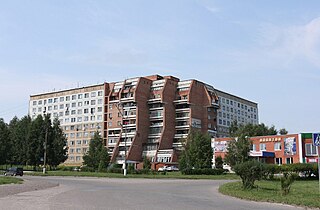
Yurga is a town in Kemerovo Oblast, Russia, located on the Tom River and the Trans-Siberian Railway. Population: 81,533 (2010 Russian census) ; 85,555 (2002 Census) ; 93,202 (1989 Soviet census) .

Tashtagol is a town in Kemerovo Oblast, Russia, located on the Kondoma River 511 kilometers (318 mi) south of Kemerovo, the administrative center of the oblast.

Topki is a town in Kemerovo Oblast, Russia, located 38 kilometers (24 mi) west of Kemerovo, the administrative center of the oblast. Population: 28,641 (2010 Russian census) ; 31,004 (2002 Census) ; 33,574 (1989 Soviet census) .

Beryozovsky is a town in Kemerovo Oblast, Russia, located between the Barzas and Shurap Rivers, 27 kilometers (17 mi) north of Kemerovo, the administrative center of the oblast. Population: 47,279 (2010 Russian census) ; 48,299 (2002 Census) ; 51,250 (1989 Soviet census) .

Belovsky District is an administrative district (raion), one of the nineteen in Kemerovo Oblast, Russia. As a municipal division, it is incorporated as Belovsky Municipal District . It is located in the center of the oblast. The area of the district is 3,400 square kilometers (1,300 sq mi). Its administrative center is the rural locality of Vishnevka. Population: 30,204 (2010 Russian census) ; 33,382 ; 25,815 (1989 Soviet census) .

Chebulinsky District is an administrative district (raion), one of the nineteen in Kemerovo Oblast, Russia. As a municipal division, it is incorporated as Chebulinsky Municipal District . It is located in the north of the oblast. The area of the district is 3,780 square kilometers (1,460 sq mi). Its administrative center is the urban locality of Verkh-Chebula. Population: 16,348 (2010 Russian census) ; 17,971 ; 17,723 (1989 Soviet census) . The population of Verkh-Chebula accounts for 31.0% of the district's total population.

Leninsk-Kuznetsky District is an administrative district (raion), one of the nineteen in Kemerovo Oblast, Russia. As a municipal division, it is incorporated as Leninsk-Kuznetsky Municipal District . It is located in the west of the oblast. The area of the district is 2,356 square kilometers (910 sq mi). Its administrative center is the city of Leninsk-Kuznetsky. Population: 23,760 (2010 Russian census) ; 27,825 ; 29,752 (1989 Soviet census) .

Novokuznetsky District is an administrative district (raion), one of the nineteen in Kemerovo Oblast, Russia. As a municipal division, it is incorporated as Novokuznetsky Municipal District . It is located in the center of the oblast and spans it from border to border in the southwest-northeast direction. The area of the district is 13,039.5989 square kilometers (5,034.6173 sq mi). Its administrative center is the city of Novokuznetsk. As of the 2010 Census, the total population of the district was 50,681.

Prokopyevsky District is an administrative district (raion), one of the nineteen in Kemerovo Oblast, Russia. As a municipal division, it is incorporated as Prokopyevsky Municipal District . It is located in the center of the oblast. The area of the district is 3,450 square kilometers (1,330 sq mi). Its administrative center is the city of Prokopyevsk. Population: 31,442 (2010 Russian census) ; 33,705 ; 35,657 (1989 Soviet census) .
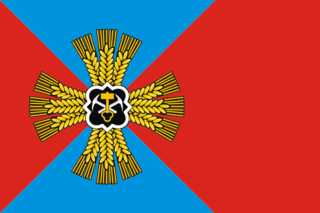
Promyshlennovsky District is an administrative district (raion), one of the nineteen in Kemerovo Oblast, Russia. As a municipal division, it is incorporated as Promyshlennovsky Municipal District . It is located in the west of the oblast. The area of the district is 3,083 square kilometers (1,190 sq mi). Its administrative center is the urban locality of Promyshlennaya. Population: 50,106 (2010 Russian census) ; 50,125 ; 47,150 (1989 Soviet census) . The population of Promyshlennaya accounts for 36.0% of the district's total population.

Topkinsky District is an administrative district (raion), one of the nineteen in Kemerovo Oblast, Russia. As a municipal division, it is incorporated as Topkinsky Municipal District . It is located in the northwest of the oblast. The area of the district is 2,774 square kilometers (1,071 sq mi). Its administrative center is the town of Topki. Population: 16,246 (2010 Russian census) ; 18,077 ; 19,018 (1989 Soviet census) .
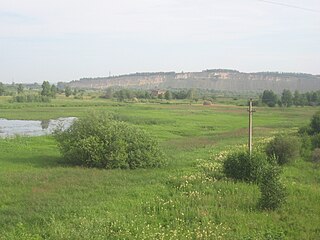
Tyazhinsky District is an administrative district (raion), one of the nineteen in Kemerovo Oblast, Russia. As a municipal division, it is incorporated as Tyazhinsky Municipal District . It is located in the northeast of the oblast. The area of the district is 3,531 square kilometers (1,363 sq mi). Its administrative center is the urban locality of Tyazhinsky. Population: 25,597 (2010 Russian census) ; 32,782 ; 32,574 (1989 Soviet census) . The population of the administrative center accounts for 43.4% of the district's total population.

Yaysky District is an administrative district (raion), one of the nineteen in Kemerovo Oblast, Russia. As a municipal division, it is incorporated as Yaysky Municipal District . It is located in the north of the oblast. The area of the district is 2,669 square kilometers (1,031 sq mi). Its administrative center is the urban locality of Yaya. Population: 20,383 (2010 Russian census) ; 24,982 ; 26,759 (1989 Soviet census) . The population of Yaya accounts for 57.3% of the district's total population.
Krasnobrodsky is an urban locality in Kemerovo Oblast, Russia. Population: 11,919 (2010 Russian census) ; 11,859 (2002 Census) ; 12,663 (1989 Soviet census) .
- 1 2 3 4 5 6 Law #215-OZ
- 1 2 3 "Review of City History" . Official site of Novokuznetsk municipal administration (in Russian). admnkz.ru. Archived from the original on March 28, 2017 . Retrieved October 5, 2012 .
- ↑ http://www.kem.kp.ru/daily/26136.7/3026076/Сергей%5B%5D Кузнецов вступает в должность главы Новокузнецка
- ↑ Russian Federal State Statistics Service (2011). Всероссийская перепись населения 2010 года. Том 1 [ 2010 All-Russian Population Census, vol. 1 ] . Всероссийская перепись населения 2010 года [2010 All-Russia Population Census] (in Russian). Federal State Statistics Service .
- 1 2 3 Law #104-OZ
- ↑ "Об исчислении времени" . Официальный интернет-портал правовой информации (in Russian). June 3, 2011 . Retrieved January 19, 2019 .
- ↑ Почта России. Информационно-вычислительный центр ОАСУ РПО. ( Russian Post ). Поиск объектов почтовой связи ( Postal Objects Search ) (in Russian)
- ↑ Russian Federal State Statistics Service. Всероссийская перепись населения 2020 года. Том 1 [ 2020 All-Russian Population Census, vol. 1 ] (XLS) (in Russian). Federal State Statistics Service .
- ↑ Federal State Statistics Service (May 21, 2004). Численность населения России, субъектов Российской Федерации в составе федеральных округов, районов, городских поселений, сельских населённых пунктов – районных центров и сельских населённых пунктов с населением 3 тысячи и более человек [ Population of Russia, Its Federal Districts, Federal Subjects, Districts, Urban Localities, Rural Localities—Administrative Centers, and Rural Localities with Population of Over 3,000 ] (XLS) . Всероссийская перепись населения 2002 года [All-Russia Population Census of 2002] (in Russian).
- ↑ Всесоюзная перепись населения 1989 г. Численность наличного населения союзных и автономных республик, автономных областей и округов, краёв, областей, районов, городских поселений и сёл-райцентров [ All Union Population Census of 1989: Present Population of Union and Autonomous Republics, Autonomous Oblasts and Okrugs, Krais, Oblasts, Districts, Urban Settlements, and Villages Serving as District Administrative Centers ] . Всесоюзная перепись населения 1989 года [All-Union Population Census of 1989] (in Russian). Институт демографии Национального исследовательского университета: Высшая школа экономики [Institute of Demography at the National Research University: Higher School of Economics]. 1989 – via Demoscope Weekly .
- ↑ "F. M. Dostoevsky Literary-Memorial Museum in Novokuznetsk" . Fyodor Dostoevsky Literary Memorial Museum. Archived from the original on March 3, 2016 . Retrieved October 17, 2012 .
- ↑ "Территориальный орган Федеральной службы государственной статистики по Кемеровской области - Кузбассу" . Retrieved May 24, 2023 .
- 1 2 "ОБ АДМИНИСТРАТИВНО-ТЕРРИТОРИАЛЬНОМ УСТРОЙСТВЕ КЕМЕРОВСКОЙ ОБЛАСТИ (с изменениями на: 29.03.2017), Закон Кемеровской области от 27 декабря 2007 года №215-ОЗ" [ ON THE ADMINISTRATIVE AND TERRITORIAL STRUCTURE OF THE KEMEROV OBLAST (as amended on: 29/03/2017), Law of the Kemerovo Oblast dated 27 December 2007 No. 215-OZ ] (in Russian). docs.cntd.ru. Archived from the original on June 24, 2019 . Retrieved August 1, 2019 .
- 1 2 3 "Устав города Новокузнецка" [ Charter of the city of Novokuznetsk ] (in Russian). Official website of the administration of Novokuznetsk (admnkz.ru). Archived from the original on October 17, 2012 . Retrieved January 4, 2013 .
- ↑ "О внесении изменений и дополнений в Устав Новокузнецкого городского округа" [ About modification and additions in the Charter of the Novokuznetsk city district ] . gigabaza.ru/ (in Russian). April 29, 2016. Archived from the original on August 1, 2019 . Retrieved August 1, 2019 .
- ↑ "Cправочник организаций Новокузнецка" [ Directory of Novokuznetsk organizations ] . novokuznetsk.jsprav.ru (in Russian). Archived from the original on August 1, 2019 . Retrieved August 1, 2019 .
- ↑ "Молодёжный парламент города Новокузнецка — общая информация" [ Youth Parliament of the city of Novokuznetsk - general information ] (in Russian). newparlament.ru. Archived from the original on July 13, 2013 . Retrieved July 13, 2013 .
- ↑ "Избранные депутаты и глава получили от населения лишь часть полномочий" [ Elected deputies and the head received only part of the powers from the population ] (in Russian). i2n.ru. October 25, 2010. Archived from the original on July 13, 2014 . Retrieved January 4, 2013 .
- ↑ Kuznetsky Rabochy , 2008, № 148
- ↑ Kuznetsky Rabochy , 2009, № 16
- ↑ Kuznetsky Rabochy , 2009, № 59
- ↑ Климат Новокузнецка (in Russian). Погода и климат. Archived from the original on January 6, 2019 . Retrieved November 5, 2021 .
- Совет народных депутатов Кемеровской области. Закон №215-ОЗ от 27 декабря 2007 г. «Об административно-территориальном устройстве Кемеровской области», в ред. Закона №131-ОЗ от 22 декабря 2014 г. «О внесении изменений в Закон Кемеровской области "О статусе и границах муниципальных образований" и Закон Кемеровской области "Об административно-территориальном устройстве Кемеровской области"». Вступил в силу в день, следующий за днём официального опубликования. Опубликован: "Кузбасс", №243, 28 декабря 2007 г. (Council of People's Deputies of Kemerovo Oblast. Law # 215-OZ of December 27, 2007 On the Administrative-Territorial Structure of Kemerovo Oblast , as amended by the Law # 131-OZ of December 22, 2014 On Amending the Law of Kemerovo Oblast "On the Status and the Borders of the Municipal Formations" and the Law of Kemerovo Oblast "On the Administrative-Territorial Structure of Kemerovo Oblast" . Effective as of the day following the official publication date.).
- Совет народных депутатов Кемеровской области. Закон №104-ОЗ от 17 декабря 2004 г. «О статусе и границах муниципальных образований», в ред. Закона №123-ОЗ от 22 декабря 2015 г. «О внесении изменений в Закон Кемеровской области "О статусе и границах муниципальных образований"». Вступил в силу со дня официального опубликования. Опубликован: "Кузбасс", №242, 24 декабря 2004 г. (Council of People's Deputies of Chelyabinsk Oblast. Law # 104-OZ of December 17, 2004 On the Status and the Borders of the Municipal Formations , as amended by the Law # 123-OZ of December 22, 2015 On Amending the Law of Kemerovo Oblast "On the Status and the Borders of the Municipal Formations" . Effective as of the official publication date.).
- (in Russian) Official website of Novokuznetsk
- Siberian State Industrial University (SIBSIU)
- (in Russian) Life in Novokuznetsk
- (in Russian) Informational website of Novokuznetsk

- Visit Our Blog about Russia to know more about Russian sights, history
- Check out our Russian cities and regions guides
- Follow us on Twitter and Facebook to better understand Russia
- Info about getting Russian visa , the main airports , how to rent an apartment
- Our Expert answers your questions about Russia, some tips about sending flowers

Russian regions
- Altay republic
- Irkutsk oblast
- Kemerovo oblast
- Novokuznetsk
- Khakassia republic
- Krasnoyarsk krai
- Novosibirsk oblast
- Omsk oblast
- Tomsk oblast
- Tuva republic
- Map of Russia
- All cities and regions
- Blog about Russia
- News from Russia
- How to get a visa
- Flights to Russia
- Russian hotels
- Renting apartments
- Russian currency
- FIFA World Cup 2018
- Submit an article
- Flowers to Russia
- Ask our Expert
Novokuznetsk city, Russia
The city of Kemerovo oblast .
Novokuznetsk - Overview
Novokuznetsk is the largest city in the Kemerovo region of Russia. It is located in the south of Western Siberia, on both banks of the Tom River, in the southern part of the region. It is an important economic, transport and cultural center of Siberia.
The population of Novokuznetsk is about 540,000 (2022), the area - 424 sq. km.
The phone code - +7 3843, the postal codes - 654000-654103.
Novokuznetsk city coat of arms

Novokuznetsk city map, Russia
History of novokuznetsk.
Novokuznetsk is one of the oldest cities in Siberia. It was founded approximately in 1617-1618. From 1620 till the end of the 18th century, it was a stockaded town located on the right bank of the Tom River.
Present Novokuznetsk was formed on July, 3, 1931, on the basis of the settlement of Sad-gorod (from 1929), near a metallurgical plant. In March 1932, it included the town of Kuznetsk and was renamed into Stalinsk in May 1932. In the 1930s, industrialization turned the town into an important coal-mining and industrial center.
Kuznetsky metallurgical plant began operating in 1931. Later, in 1941, two evacuated plants were also put into operation in the city: Novokuznetsky aluminum plant and Kuznetsky iron-alloys plant. Kuznetsky metallurgical plant produced military products, several tank armies were produced of steel produced in Novokuznetsk.
Later, in 1961, the West-Siberian metallurgical plant was constructed. November 5, 1961, Stalinsk was renamed in Novokuznetsk. According to the census conducted in 1989, the population of the city was 599,900.
By 1998, the city was in decline. The crisis of 1998 led to the devaluation of the ruble and coal mining and ferrous metallurgy became profitable again. The economic growth of the 2000s caused rapid construction in the city.
Novokuznetsk views

Tram tracks leading to Novokuznetsk Railway Station
Author: Vladimir Shekhtman

Novokuznetsk architecture

Apartment buildings in Novokuznetsk
Novokuznetsk - Features
Novokuznetsk is one of the largest metallurgical and coal production centers in Russia, although most of the mines on the territory of the city are closed.
The distance from Moscow by roads is 3,751 km. Novokuznetsk City Day is celebrated on the first Sunday of July. It is the largest city after Tolyatti that doesn’t have the status of an administrative center of the region.
Novokuznetsk is characterized by sharply continental climate. The average temperature in January is minus 15.2 degrees Celsius, in July - plus 18.8 degrees Celsius.
From Novokuznetsk railway station you can go by train to Moscow, St. Petersburg, Novosibirsk, Vladivostok, Barnaul, Tomsk, Abakan and other cities, as well as to Kazakhstan and Kyrgyzstan. International Airport Novokuznetsk (Spichenkovo) offers flights to Moscow, Krasnoyarsk, Bangkok (Thailand), Kamran (Vietnam).
The main industries of Novokuznetsk: ferrous metallurgy, coal mining, non-ferrous metallurgy, power engineering, machine-building, and metal-working. The environmental situation is unfavorable in the city. Air pollution is mainly caused by the metallurgical plants.
Attractions of Novokuznetsk
Despite the fact that Novokuznetsk is a relatively young city, it has 37 different objects of cultural heritage, 43 archeological monuments, 3 memorial complexes, more than 70 memorials and plaques.
Among the preserved pre-revolutionary stone buildings of Novokuznetsk are: Transfiguration Cathedral (1792-1835), Kuznetsk fortress with barracks, Novokuznetsk distillery.
- Novokuznetsk Museum of Local Lore, the first museum in the region, has expositions dedicated to natural resources, flora and fauna of the Kuznetsk region, the history of the region and the city (Pionerskiy Avenue, 24);
- Novokuznetsk Art Museum, opened in 1961, was the first art museum in the region. The museum has works made by local artists, rare icons, as well as paintings of the Russian artists of the late 18th-19th and the 20th century (Kirova Street, 62);
- Novokuznetsk Literary Museum named after F.M.Dostoyevsky tells the story of love of F.M. Dostoevsky and M.D. Isayeva, their wedding in the city and the reflection of these events in the writer’s works. The museum has a large library and a collection of photographs (Dostoyevsky Street, 29);
- The Memorial Museum of Military and Labor Glory of Kuznetsk Metallurgists possesses over 2,500 exhibits (photos, original documents, awards, soldiers’ belongings, equipment, letters, shell-splinters, trophies, samples of military products, etc.) (Pobed Square, 1/1);
- The Historical and Architectural Museum “Kuznetsk Fortress” exhibits the town of Kuznetsk at the end of the 19th - early 20th centuries. Excursions are held round the old fortress (Krepostnoy pr-d, 1);
- The History Museum of the Siberian State Industrial University (Kirova Street, 42, rooms #234, #239);
- The Roerichs’ Family Museum (Kosygina Street, 35b);
- The Museum of Science and Technology named after I.P.Bardin (Metallurgov Avenue, 17).
- Novokuznetsk Drama Theater (Metallurgov Avenue, 28),
- Novokuznetsk Puppet Theater (Metallurgov Avenue, 31),
- Fire theater “ShinHi” (Bardina Avenue, 27),
- Musical Theater “The Seventh Morning” (Michurina Street, 4).
Other cultural institutions
- Novokuznetsk Governor Jazz Club “Helicon” (Pokryshkina Street, 4),
- Novokuznetsk State Circus (Kirova Street, 70),
- Novokuznetsk Planetarium (Metallurgov Avenue, 16a).
Novokuznetsk city of Russia photos
Streets of novokuznetsk.

Novokuznetsk street view

Novokuznetsk scenery

Novokuznetsk city scenery
Pictures of Novokuznetsk

Suvorov monument in Novokuznetsk

Monument to the Unknown Soldier in Novokuznetsk

Busy street in Novokuznetsk
Sights of Novokuznetsk

Transfiguration Cathedral in Novokuznetsk
Author: Karsten Ivan

Chapel of the Assumption of the Virgin in Novokuznetsk
The questions of our visitors
The comments of our visitors.
- Currently 3.04/5
Rating: 3.0 /5 (199 votes cast)

IMAGES
VIDEO
COMMENTS
Products and services sold by tour operators . Tour operators have a number of products and services that they sell, depending on their specific business model, business intentions and target market. A tour operator will typically package together two of more elements to form a packaged product, which is then sold at an inclusive price. ...
A tour operator is a business that typically combines and organizes accommodations, meals, sightseeing and transportation components, [1] in order to create a package tour. They advertise and produce brochures to promote their products, holidays and itineraries. Tour operators can sell directly to the public or sell through travel agents or a ...
Tour operators do sales and marketing of tourist products. Tour operators buy individual travel components, separately and combine them into a tour package, which is sold with their own price tag to the public directly. Tour operators do marketing of tourist destinations and tourism product to attracts the attention of the tourists/travelers.
A tour operator is a hospitality professional who organizes tours and provides support to customers during trips to help them have positive experiences. These professionals advise customers on different tour packages based on their budget and interests. They handle all logistical aspects of a tour, such as booking tickets and reserving ...
Tour Operator's Products and Services. To realize the facilities and experience a tourism product offers, service is required by skilled and qualified staff. The tour operator provides the following typical products and services −. Accommodations. The tourist destinations are equipped with different types of accommodations.
As one of the world's leading tourism groups, TUI believes that our work should reflect the fun, excitement and adventure of travel. For more than 19 million customers TUI Group offers all services under one roof with leading tour operator brands, 1,200 travel agencies, online portals, airlines and incoming services.
A tour operator not to be confused with a travel agency thinks up ideas for holidays, researches the ideas, designs the holiday itinerary, and contracts all the services needed. Types of Tour Operators. Tour operators can be divided into five main categories: inbound, outbound, domestic, receptive, and ground. 1.Inbound Tour Operators
Nearly 165,000 T+L readers completed the 2023 survey, an increase of nearly 25 percent over pre-pandemic voting levels. A total of more than 685,000 votes were cast across over 8,500 unique ...
Tour operators design and create tour packages, manage travel logistics, and provide tourism products. Travel agents, on the other hand, act as intermediaries between travelers and tour operators or suppliers. They assist customers in choosing and booking the right travel options, including tours created by tour operators, but they don't create ...
Receptive Tour Operators provide tourism products, whether in the form of packages or single components, ... RTOs are experts in their market, and help their customers to find the best accommodation providers, services and activities in their chosen destination. This type of tour operator makes money by adding a percentage rate to the final ...
Find out which other companies round out the list of the best tour operators below. 1. DuVine Cycling + Adventure Co. DuVine Cycling + Adventure Co. bike tour in Mallorca.Patitucci Photo/Courtesy ...
TripMatrix allows you to add your products and services, build trips, create and promote offers, payment processing, and much more. Request a Demo. Watch Overview Video. Contacts. A simple way to add and manage contacts. ... Inbound Tour Operators. Definition of Inbound Tour Operators; An inbound tour operator is a company that specializes in ...
For example, they may negotiate special prices with local travel services, identify the best local tour guides and organise transfers to remote locations. 5. Receptive tour operator A receptive tour operator provides tourism products to other tour operators or travel agents, rather than members of the public directly. They may provide ...
A tour operator controls, books and devises the whole trip. They create a package holiday by combining all elements such as hotel, airport transfers, activities, restaurants, tours and such like. A tour may not include all of these elements, the list is purely an example. The Difference between a tour operator and a travel agent is that a tour ...
Indirect traditional distribution channels can include travel distribution services such as travel agents, tourism information centers, flyers and print/ digital brochures, promotional marketing services, and tour operators. Depending on your products and services, wholesalers can also make up part of your business' traditional distribution ...
Tour Operators provide the best and most competitive prices to the traveler. Tour operators play an important role in negotiating with tourism suppliers (such as hotels, cruises, guides, airlines, etc.) Tour Operators also buy products in bulk, getting them at discounted rates. As a result of it, travelers get the best holiday package possible.
How tour operators can make a positive economic impact on a destination. ... By choosing to support local products and services, you decrease the leakage and engage in sustainable tourism. A few ways to do this are by seeking out locally-owned restaurants serving local fare, hiring local tour guides and staying in locally-owned accommodation. ...
By carefully crafting your promotion and utilizing this distribution channel, you can attract new customers and generate additional revenue for your business. 8. Hotel concierges. While traditional, working with hotel concierges is a highly effective distribution channel for tour and activity operators.
A tour operator owns a high volume of travel services across carriers, services, and accommodation. Some most important functions of the tour operators are following: Planning a Tour. Making Tour Package. Arranging a Tour. Travel Information. Reservation. Travel Management. Evaluate the Option Available.
Save. Share. 13 reviews. #22 of 219 Restaurants in Novokuznetsk ₹₹ - ₹₹₹, Chinese, Japanese, Asian. Kirova, 55 Mall Citi Moll, Novokuznetsk 654080 Russia. +7 384 332-03-33 + Add website + Add hours Improve this listing. See all (9) There aren't enough food, service, value or atmosphere ratings for Asia Hall yet.
It is located in the center of the oblast and spans it from border to border in the southwest-northeast direction. The area of the district is 13,039.5989 square kilometers (5,034.6173 sq mi). Its administrative center is the city of Novokuznetsk. As of the 2010 Census, the total population of the district was 50,681.
Novokuznetsk is one of the oldest cities in Siberia. It was founded approximately in 1617-1618. From 1620 till the end of the 18th century, it was a stockaded town located on the right bank of the Tom River. Present Novokuznetsk was formed on July, 3, 1931, on the basis of the settlement of Sad-gorod (from 1929), near a metallurgical plant.
Novokuznetsk is a big metallurgy and coal city in the south of Kemerovo Oblast. Novokuznetsk has about 534,000 residents. Mapcarta, the open map.